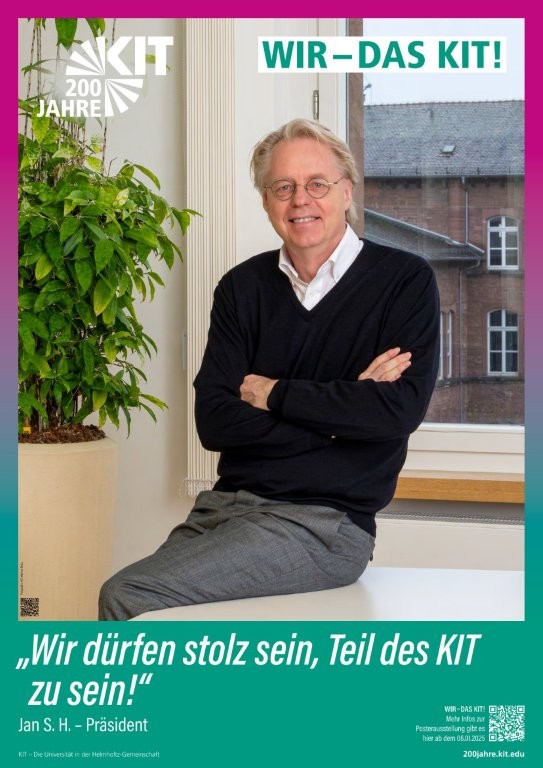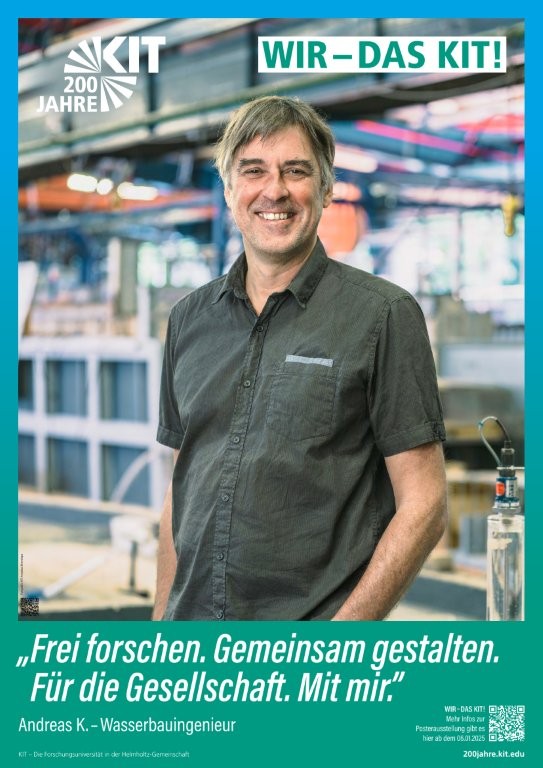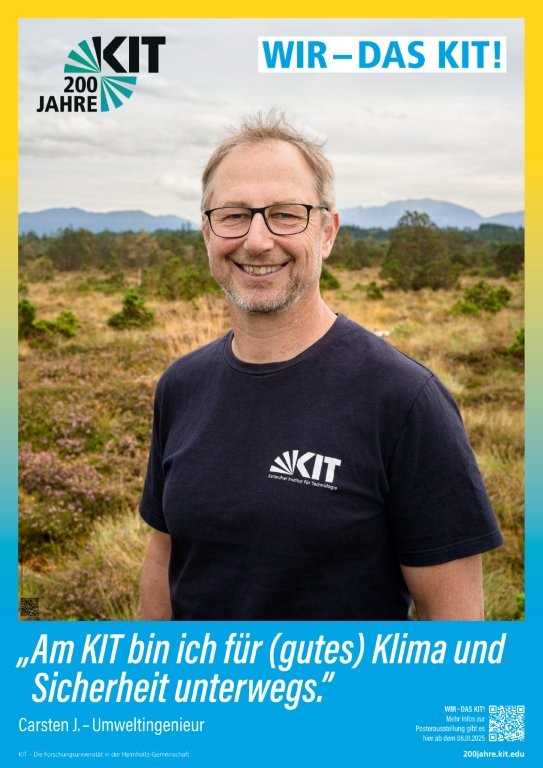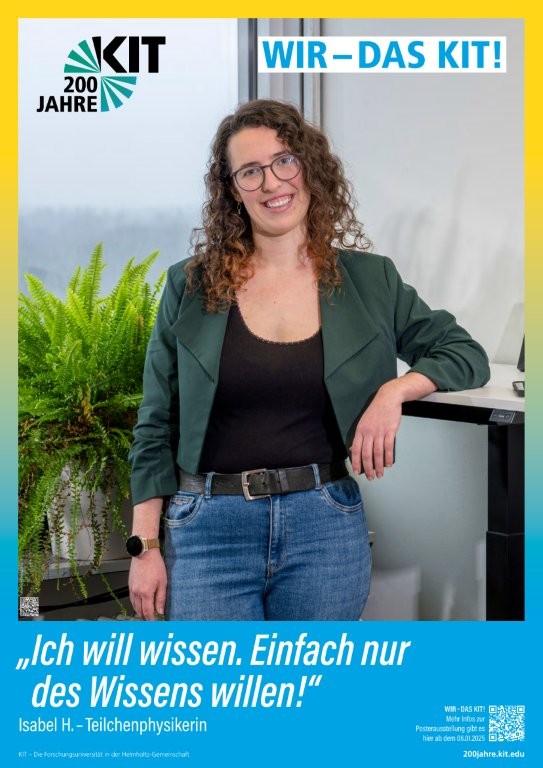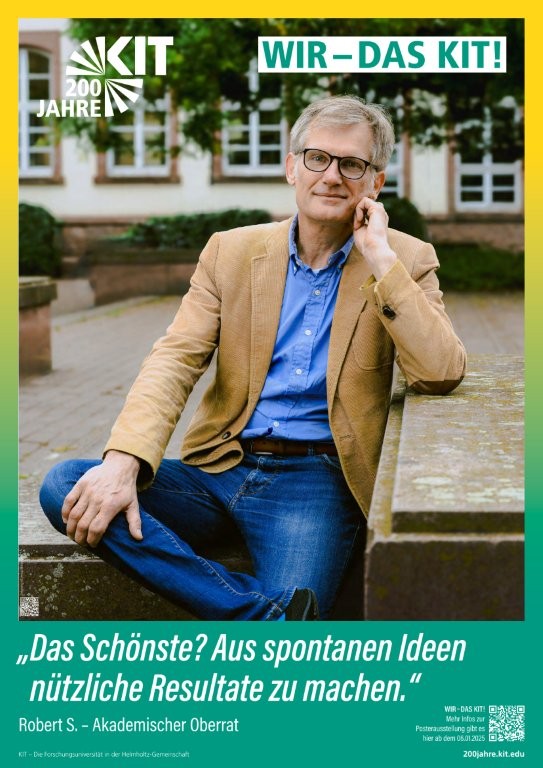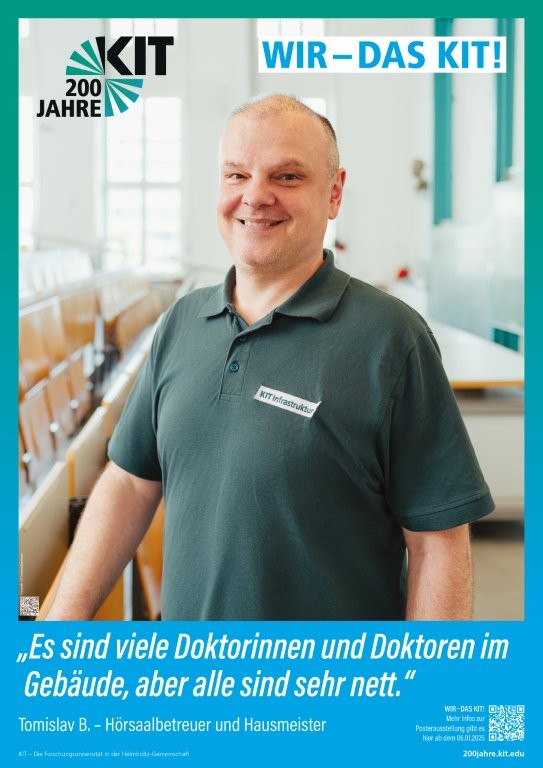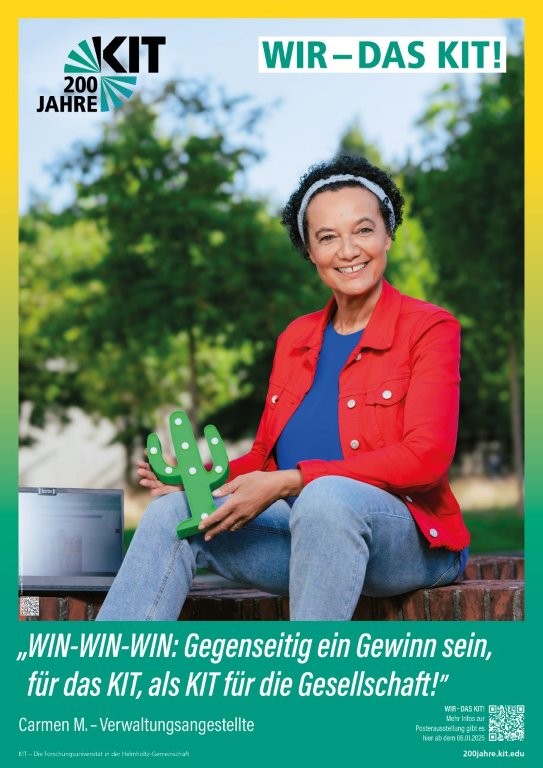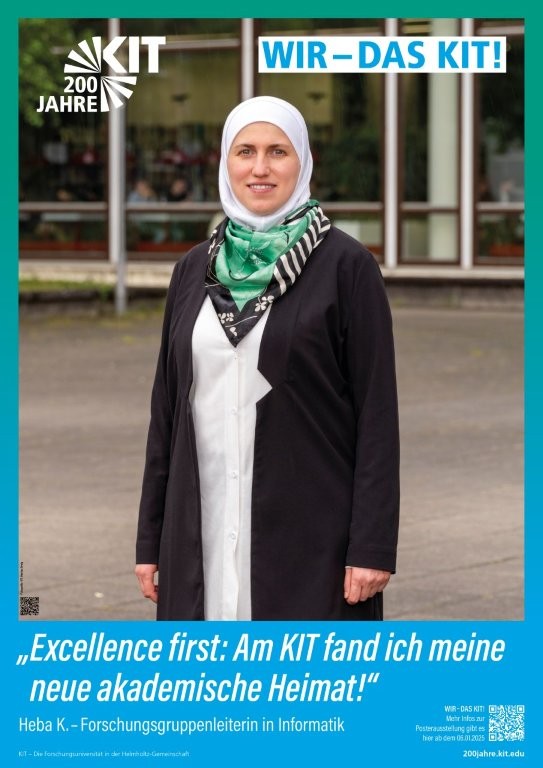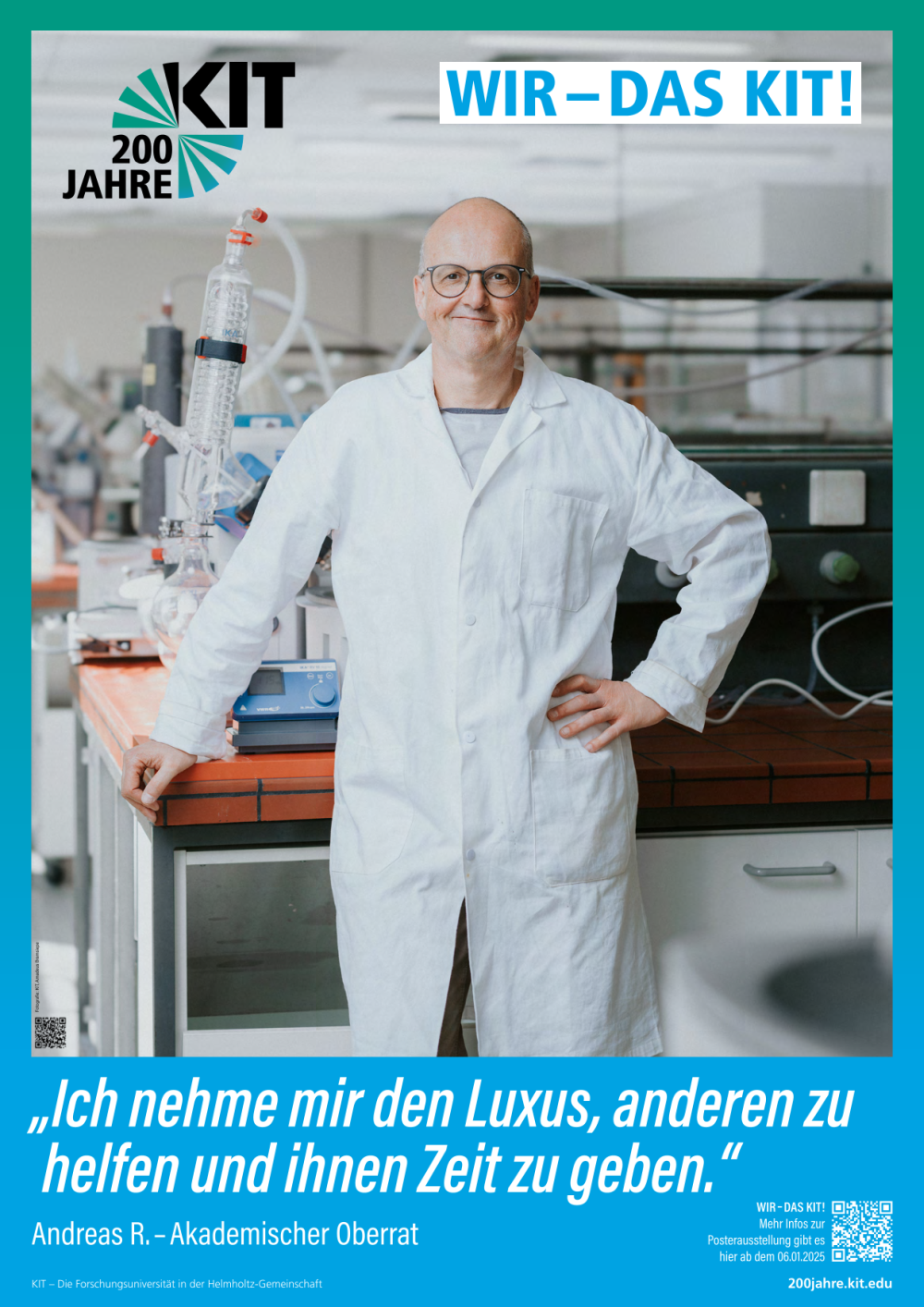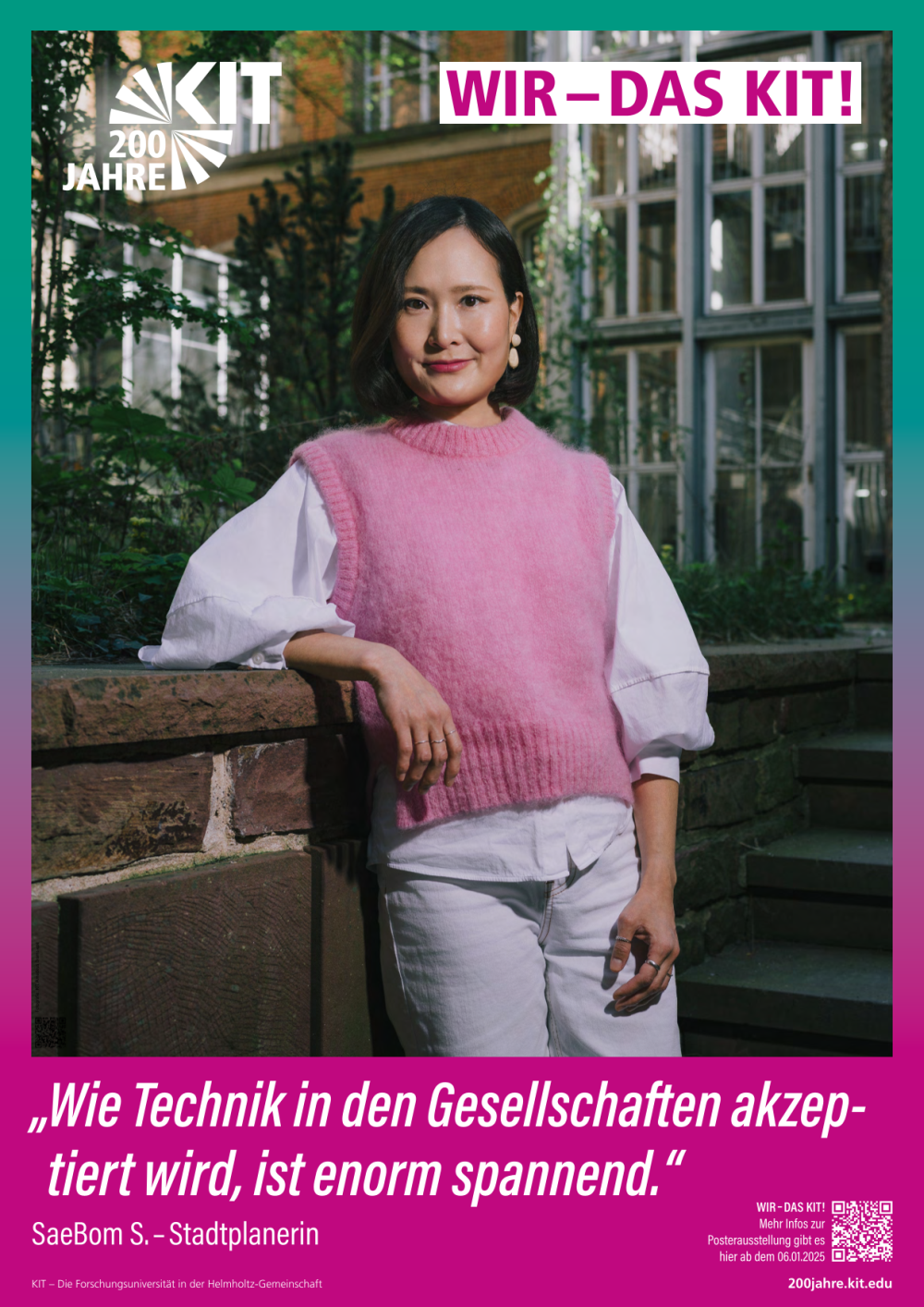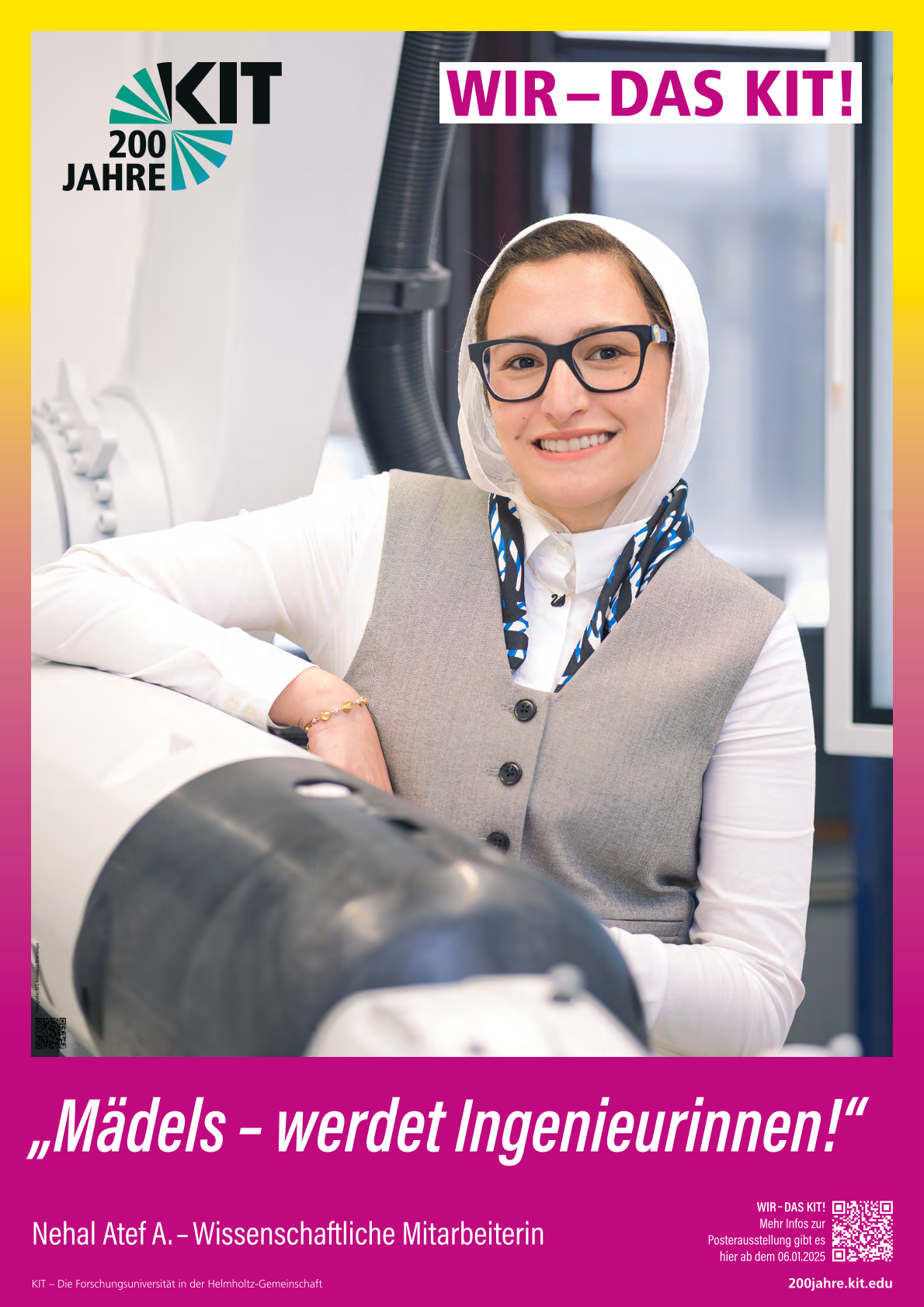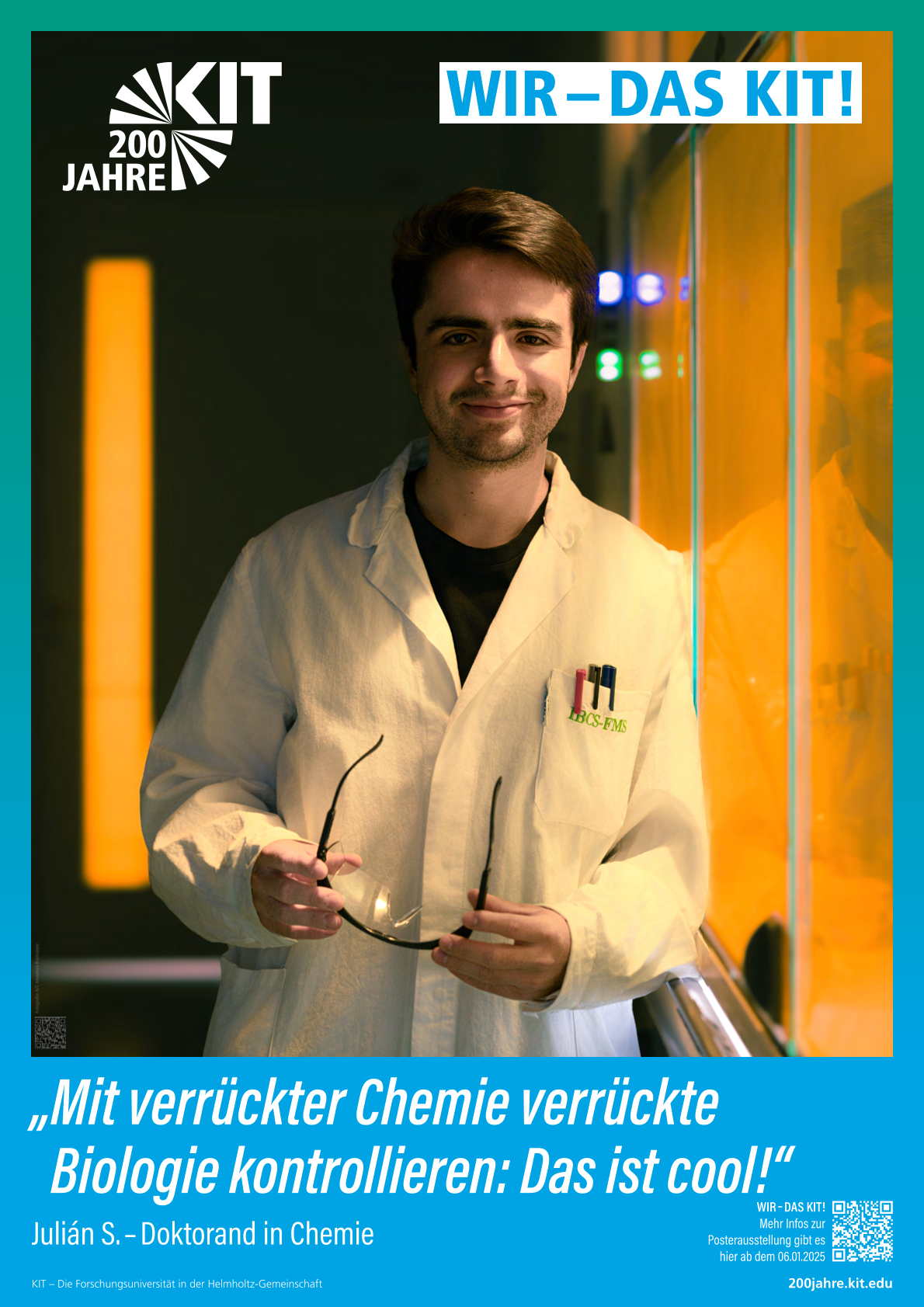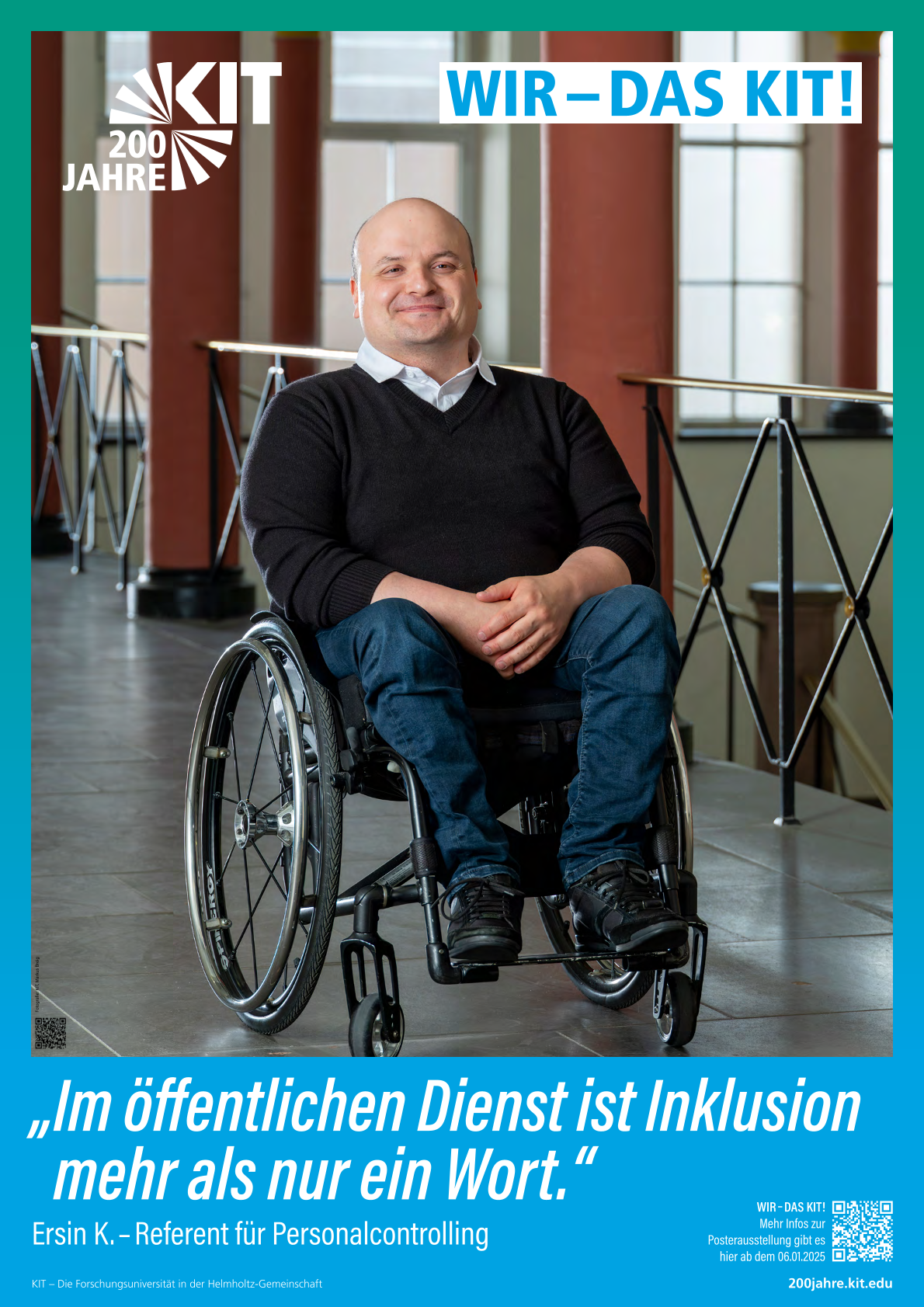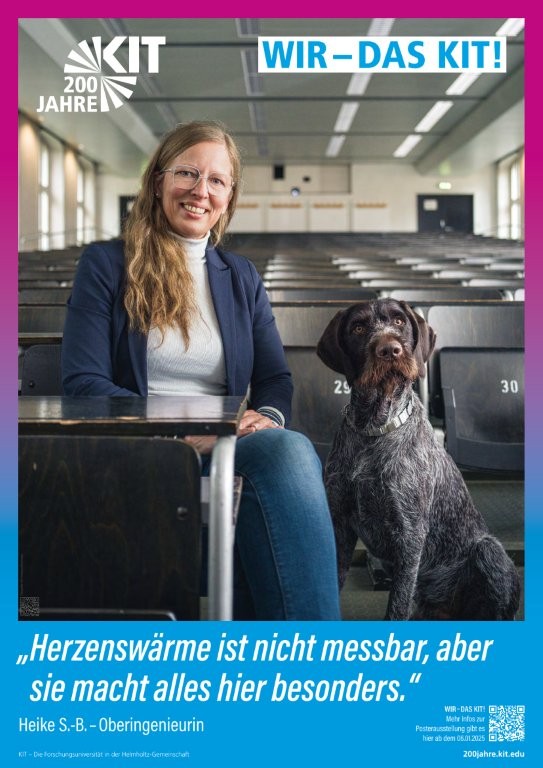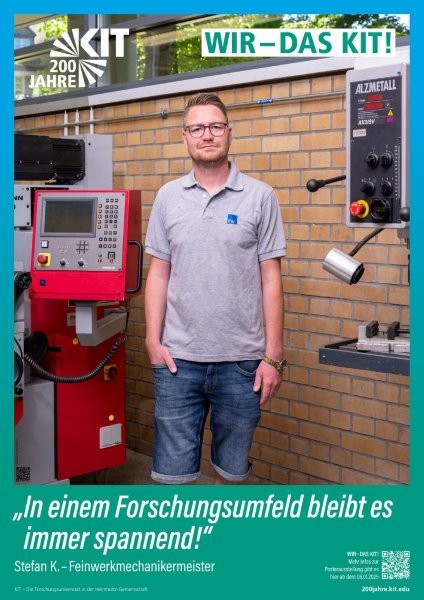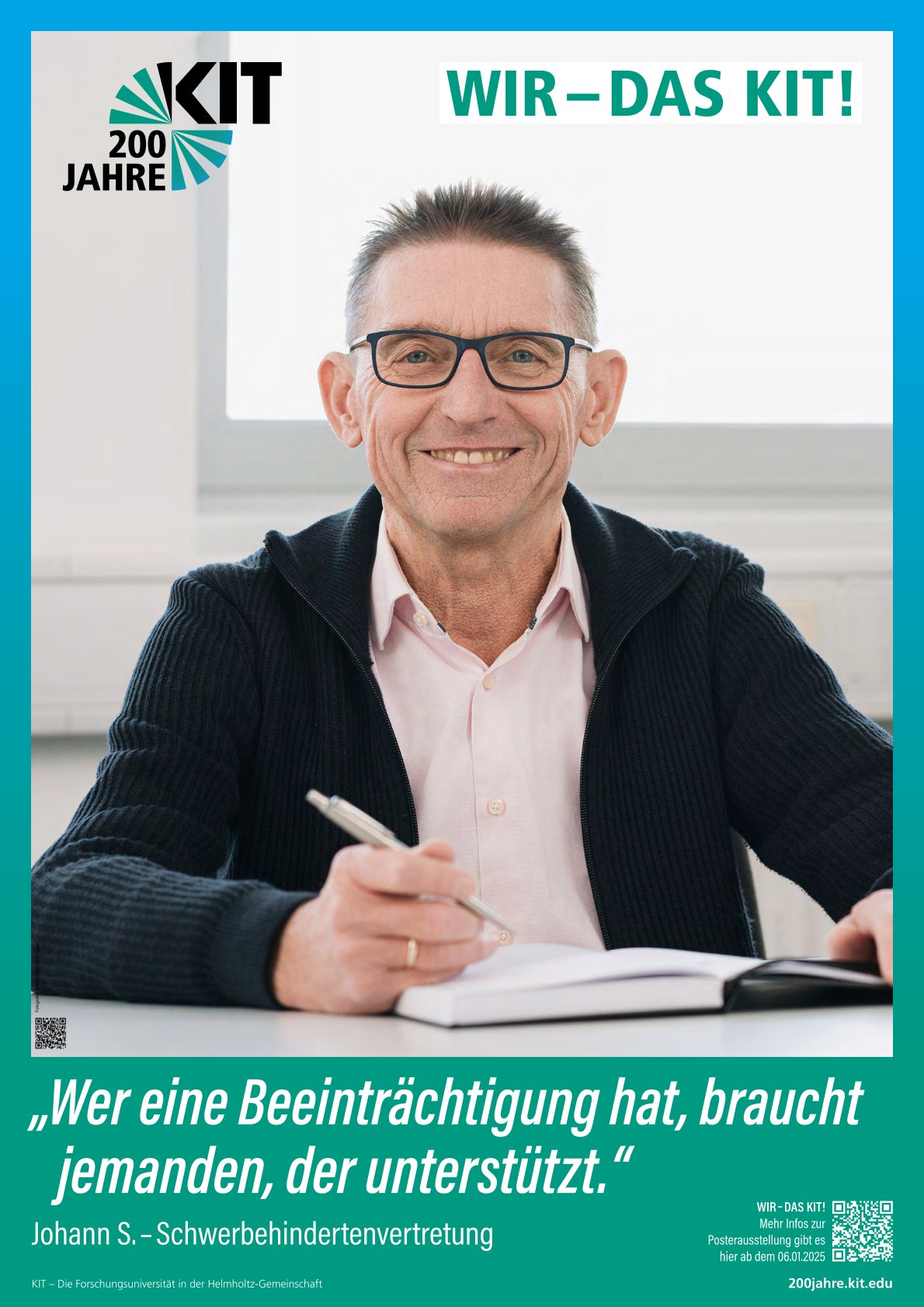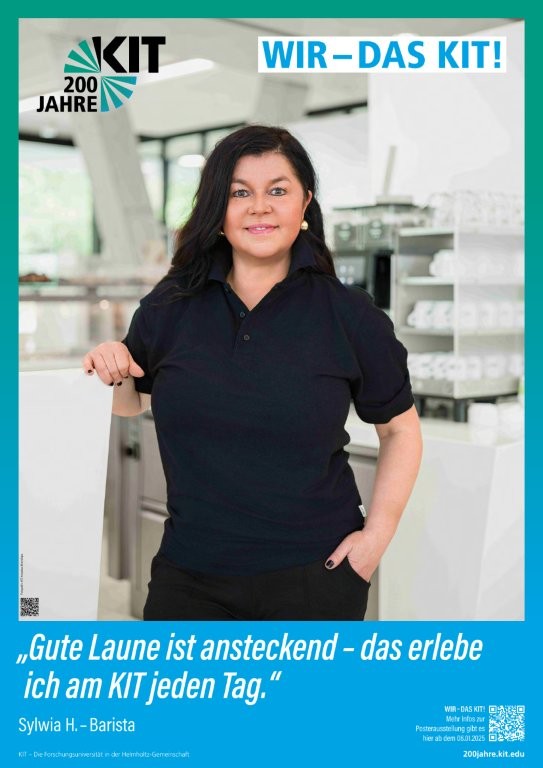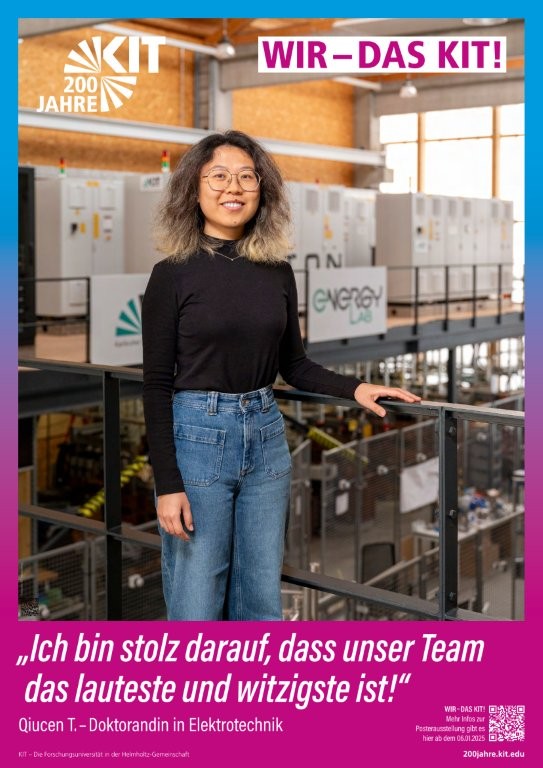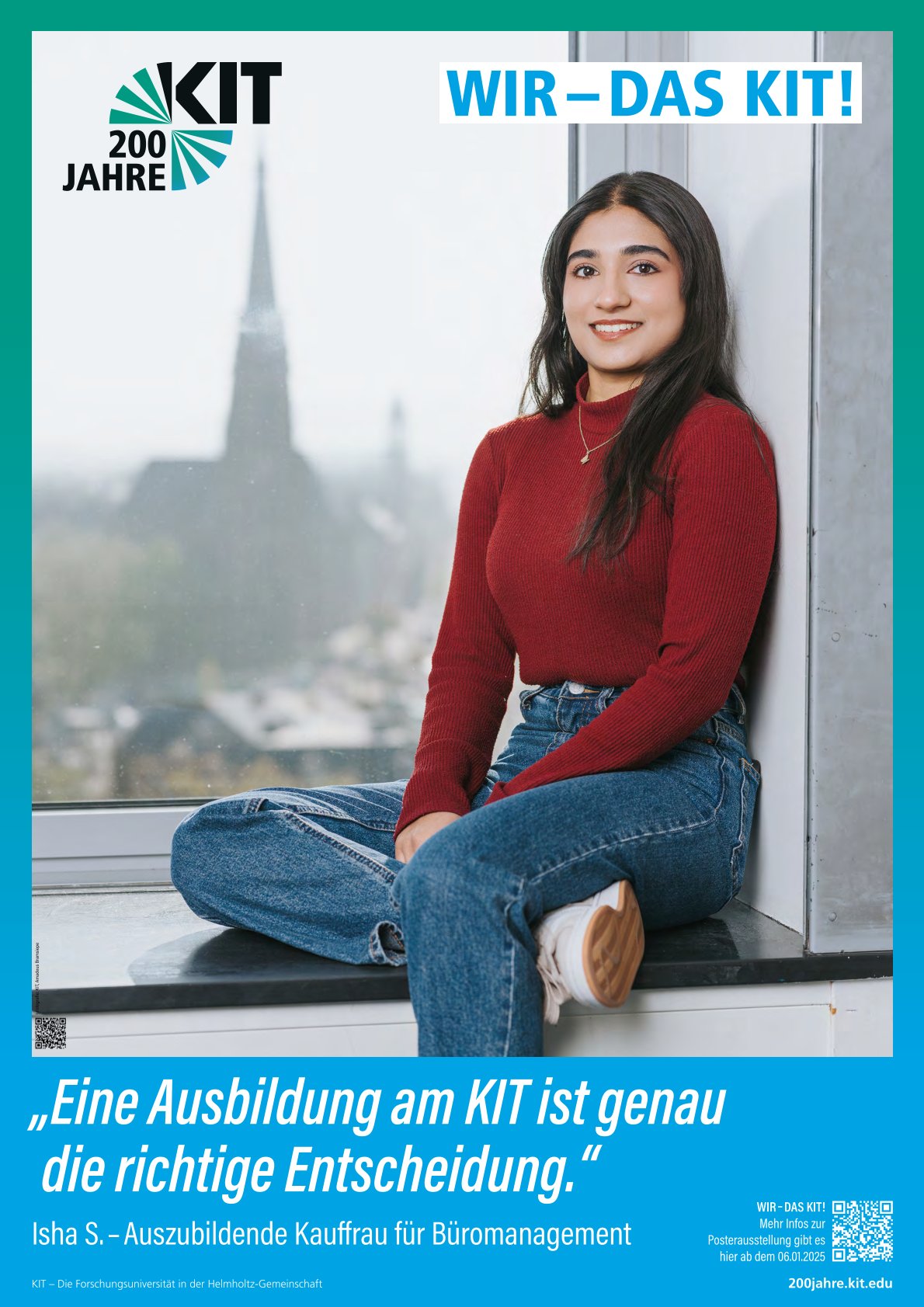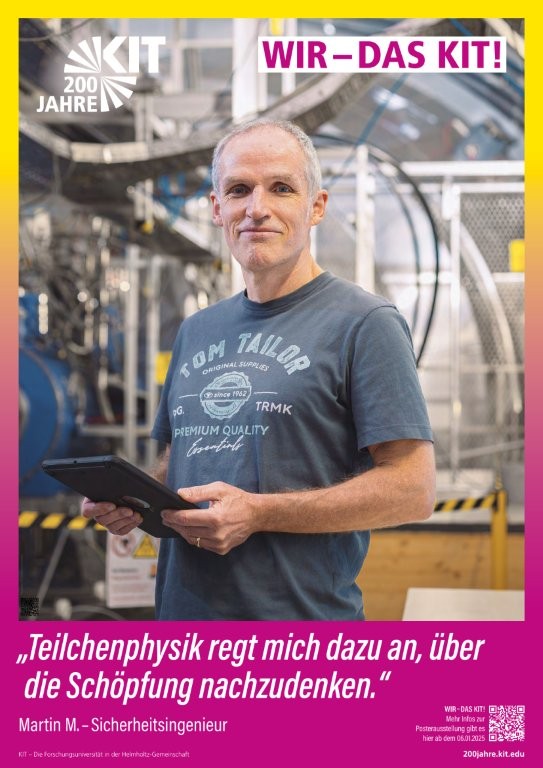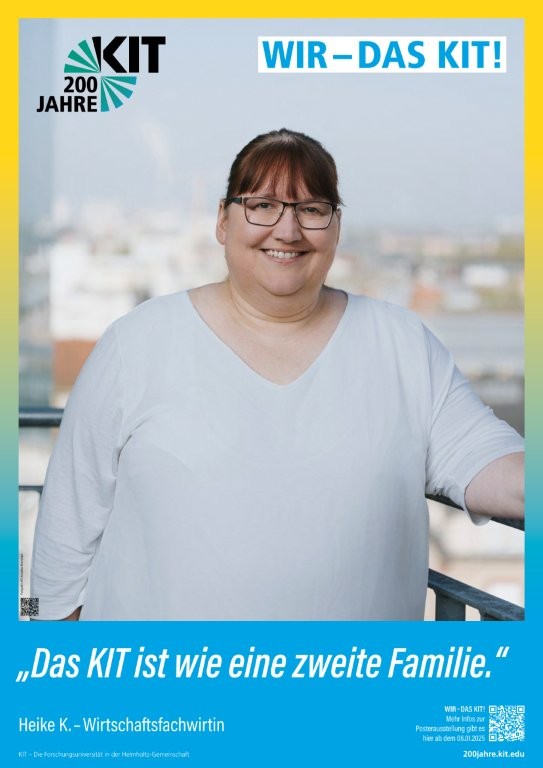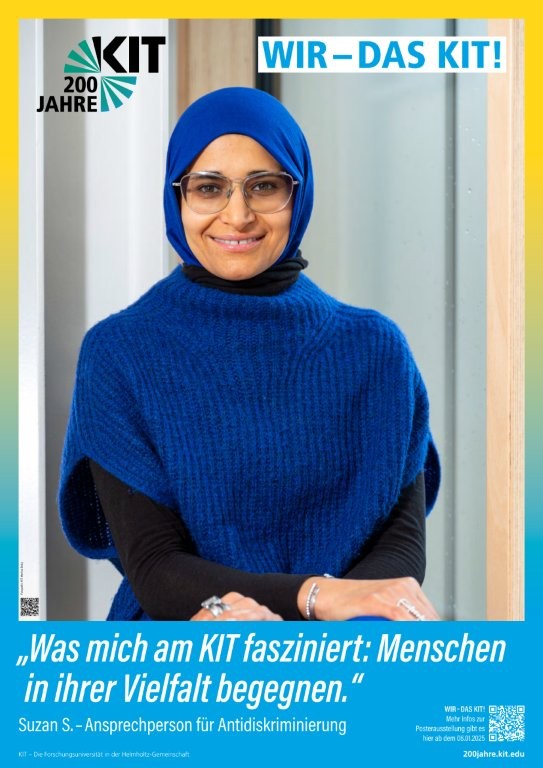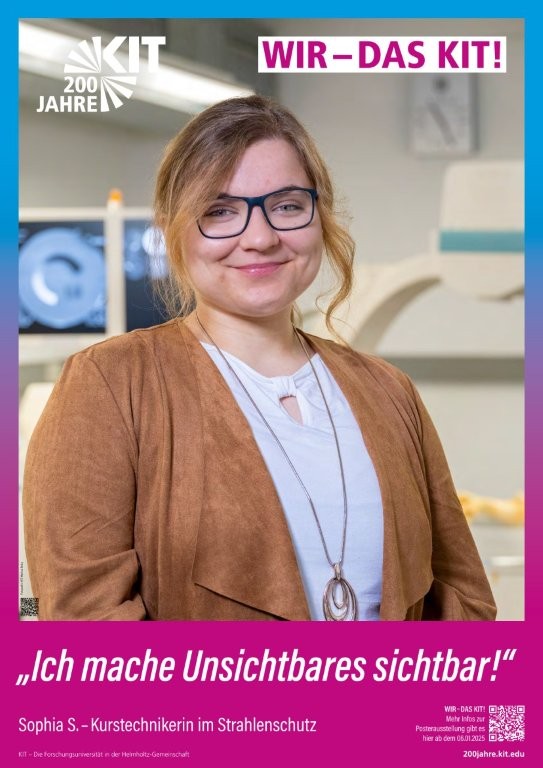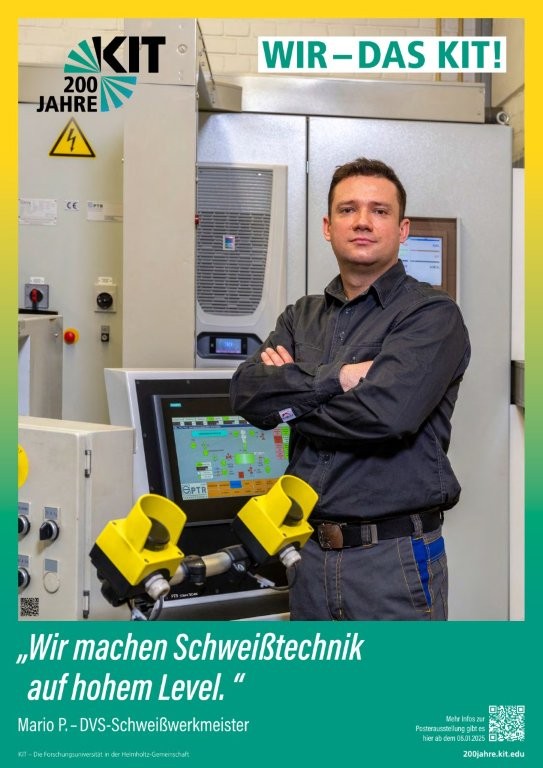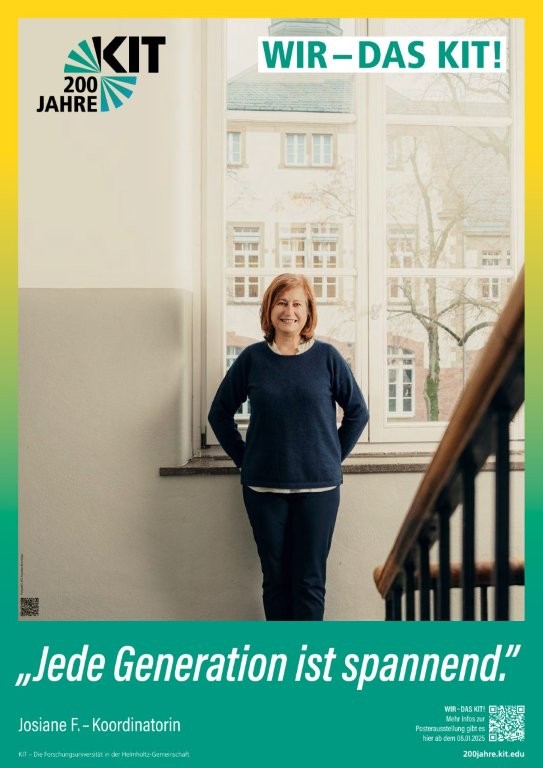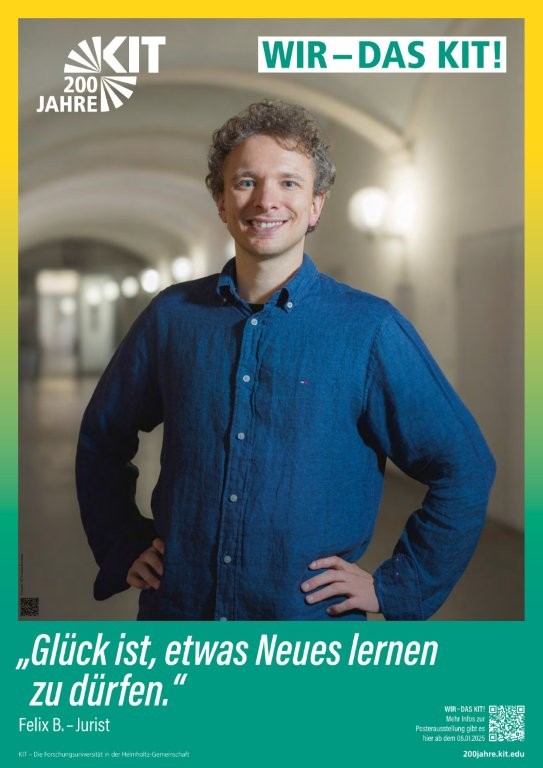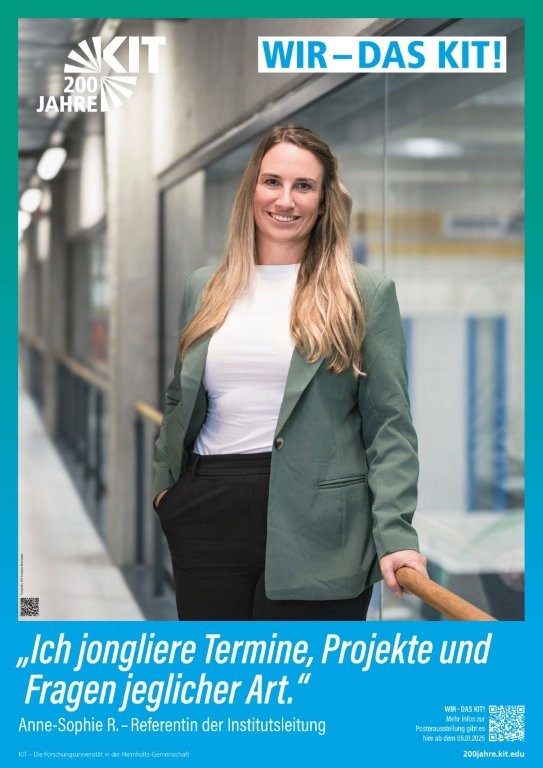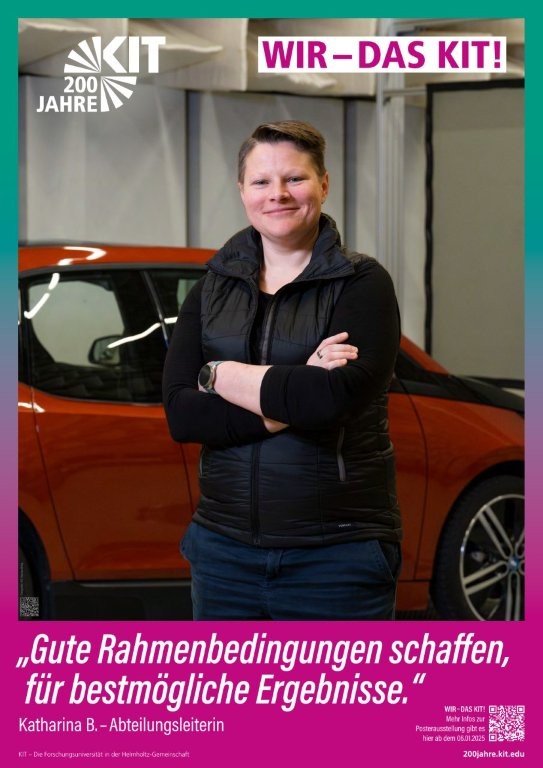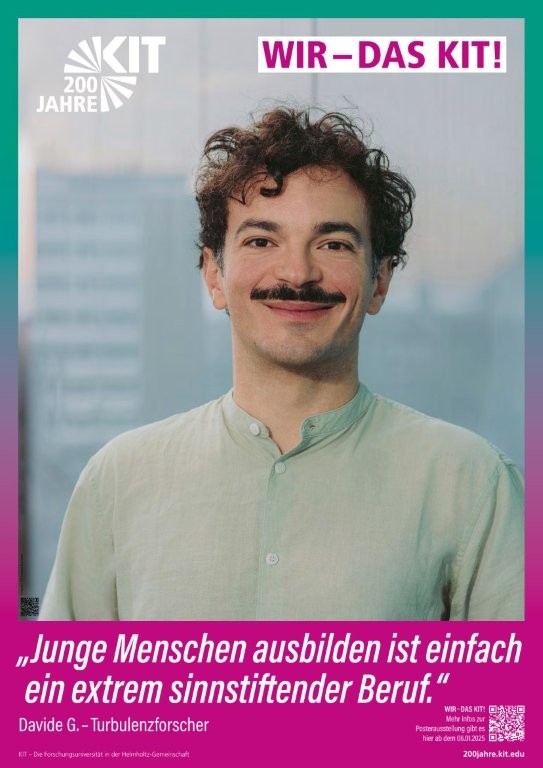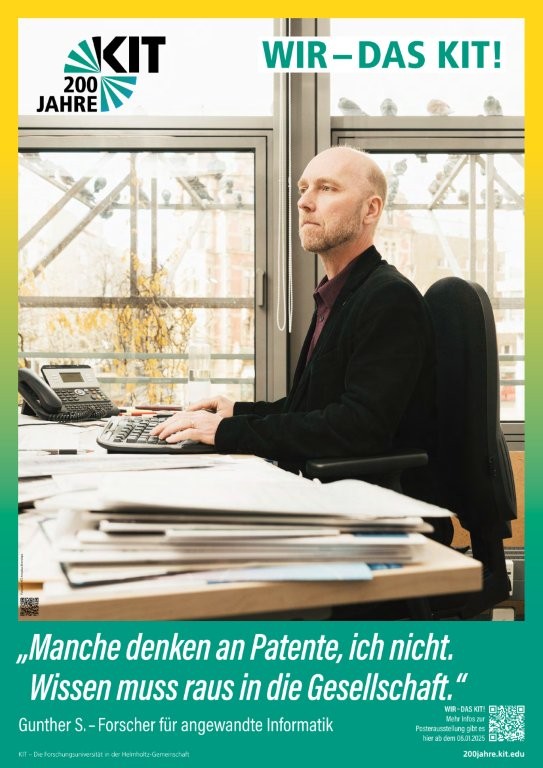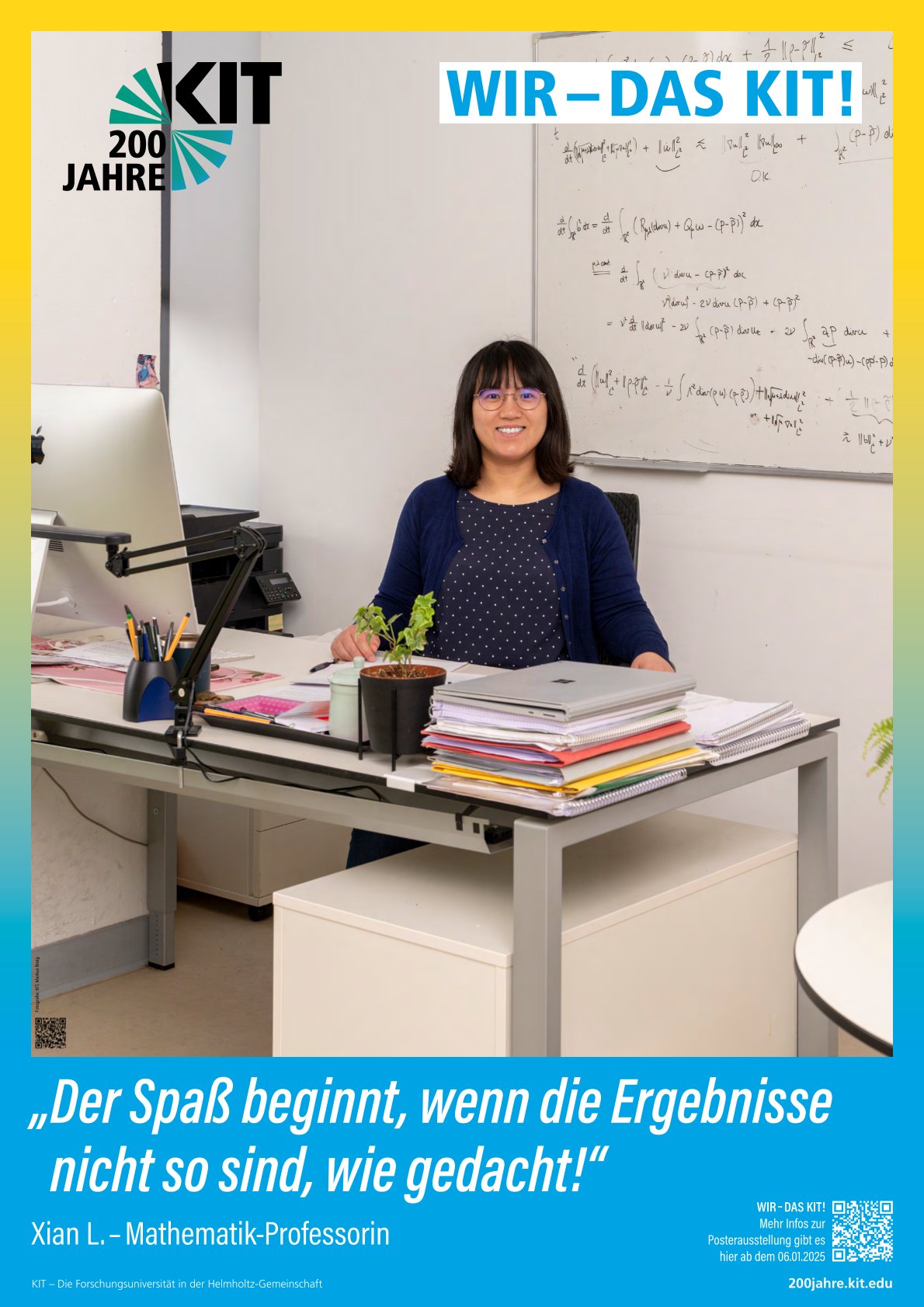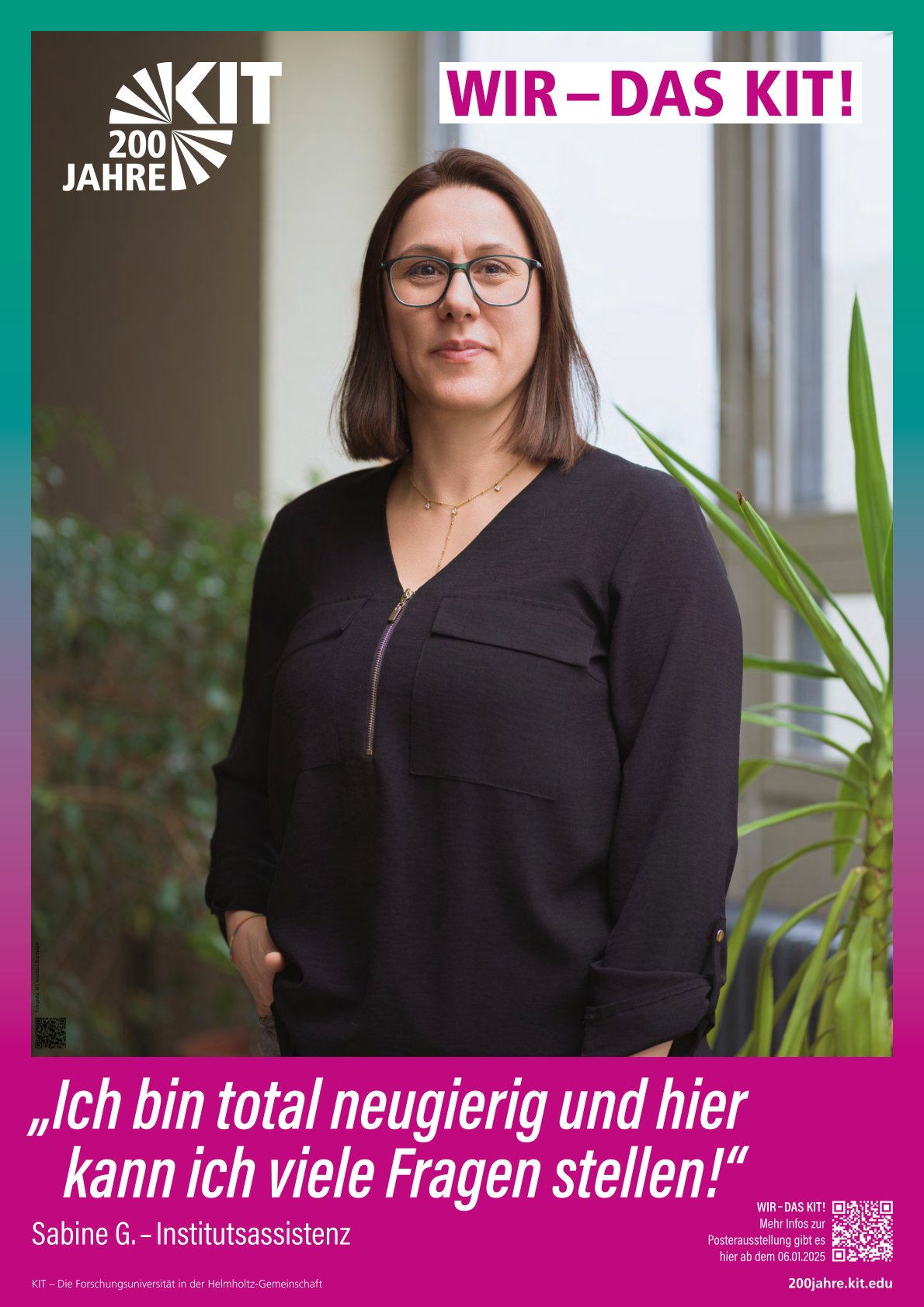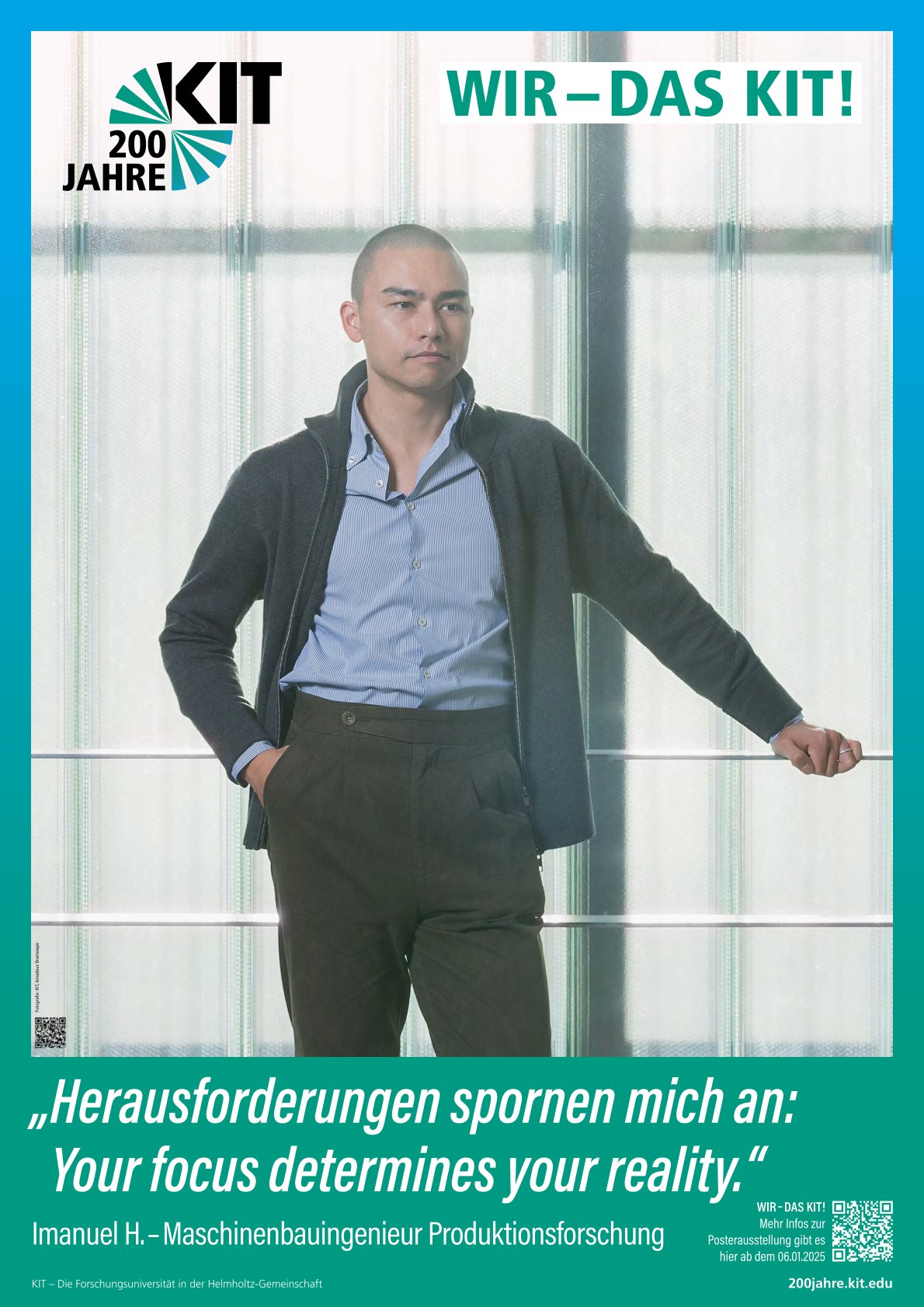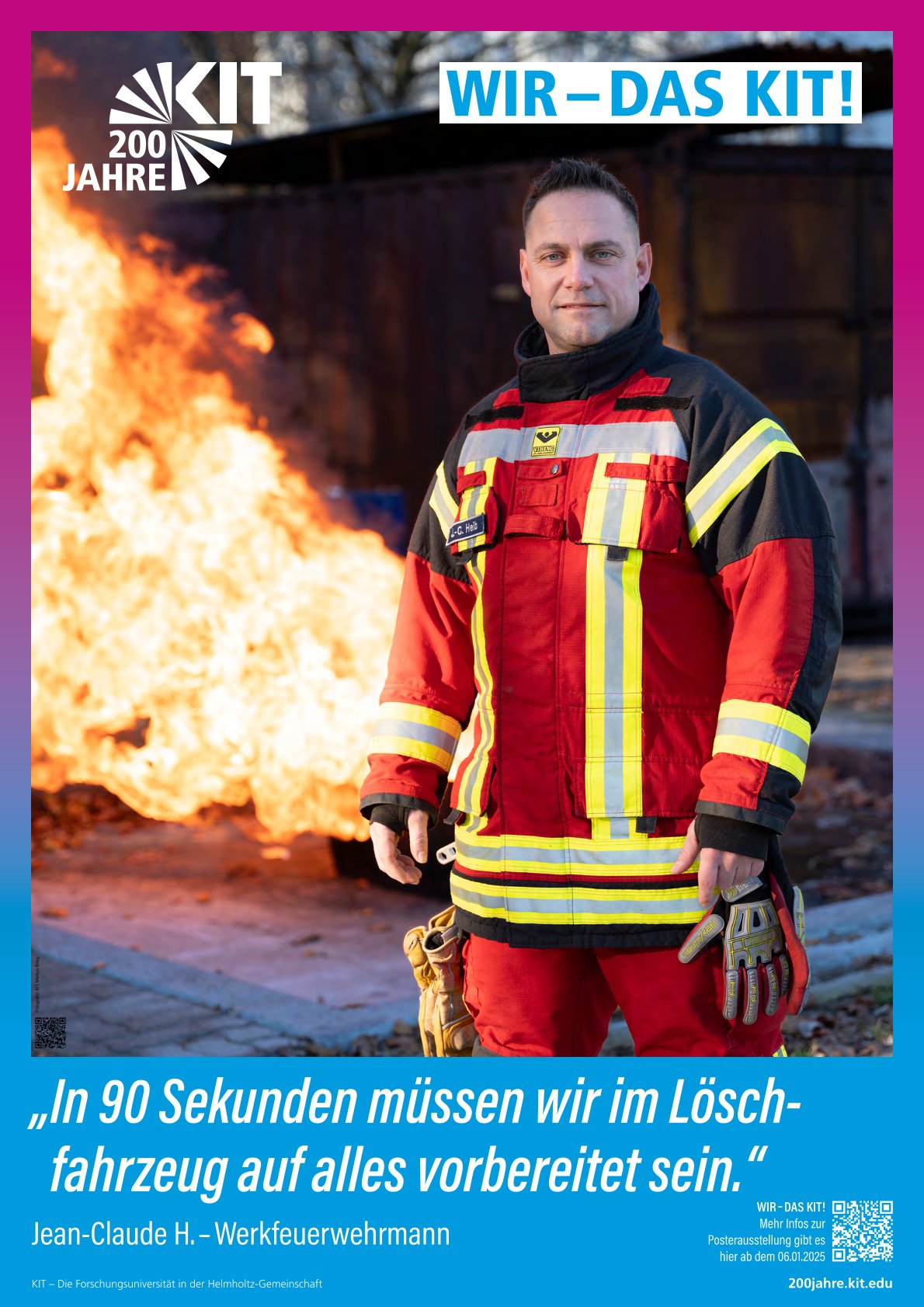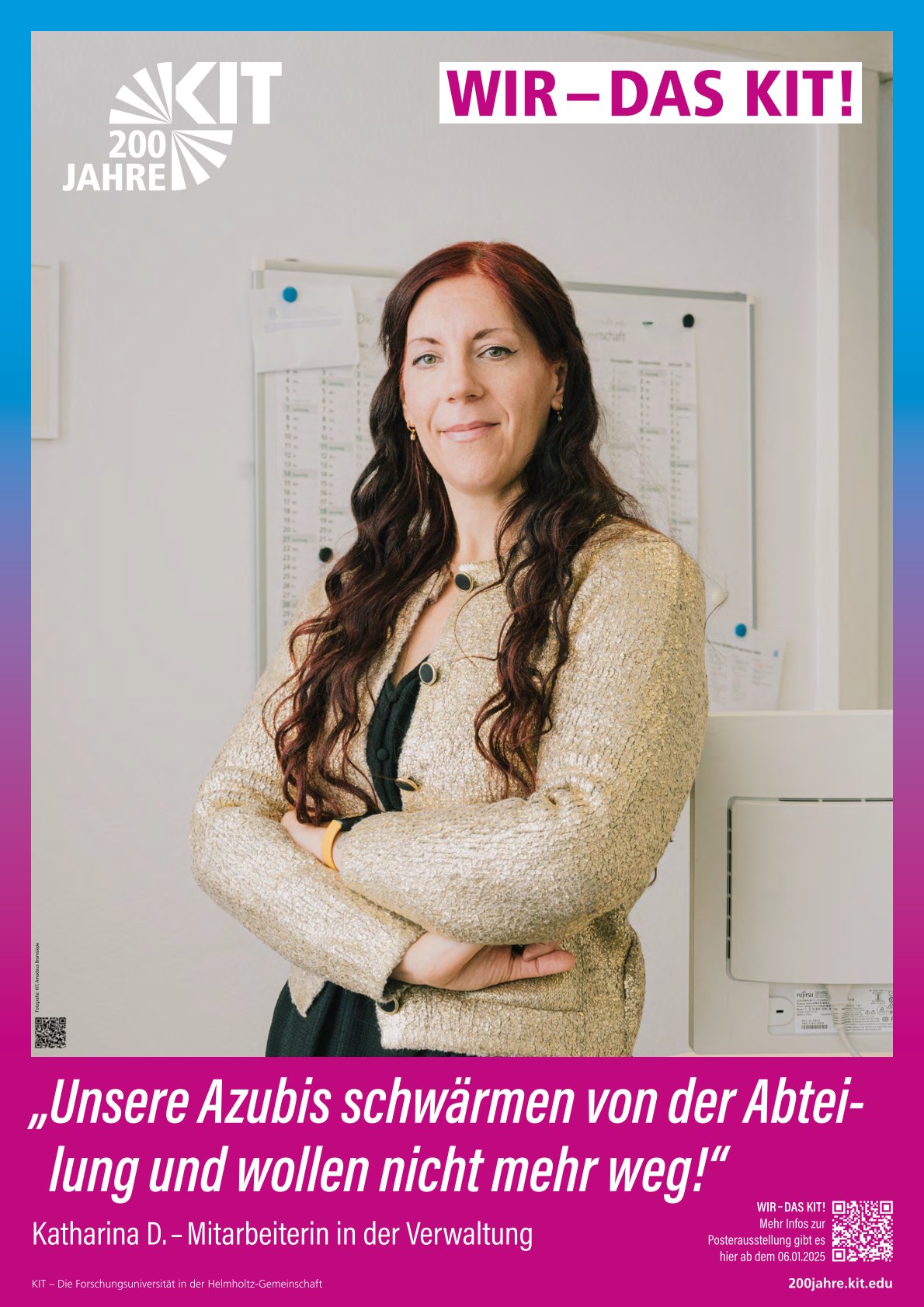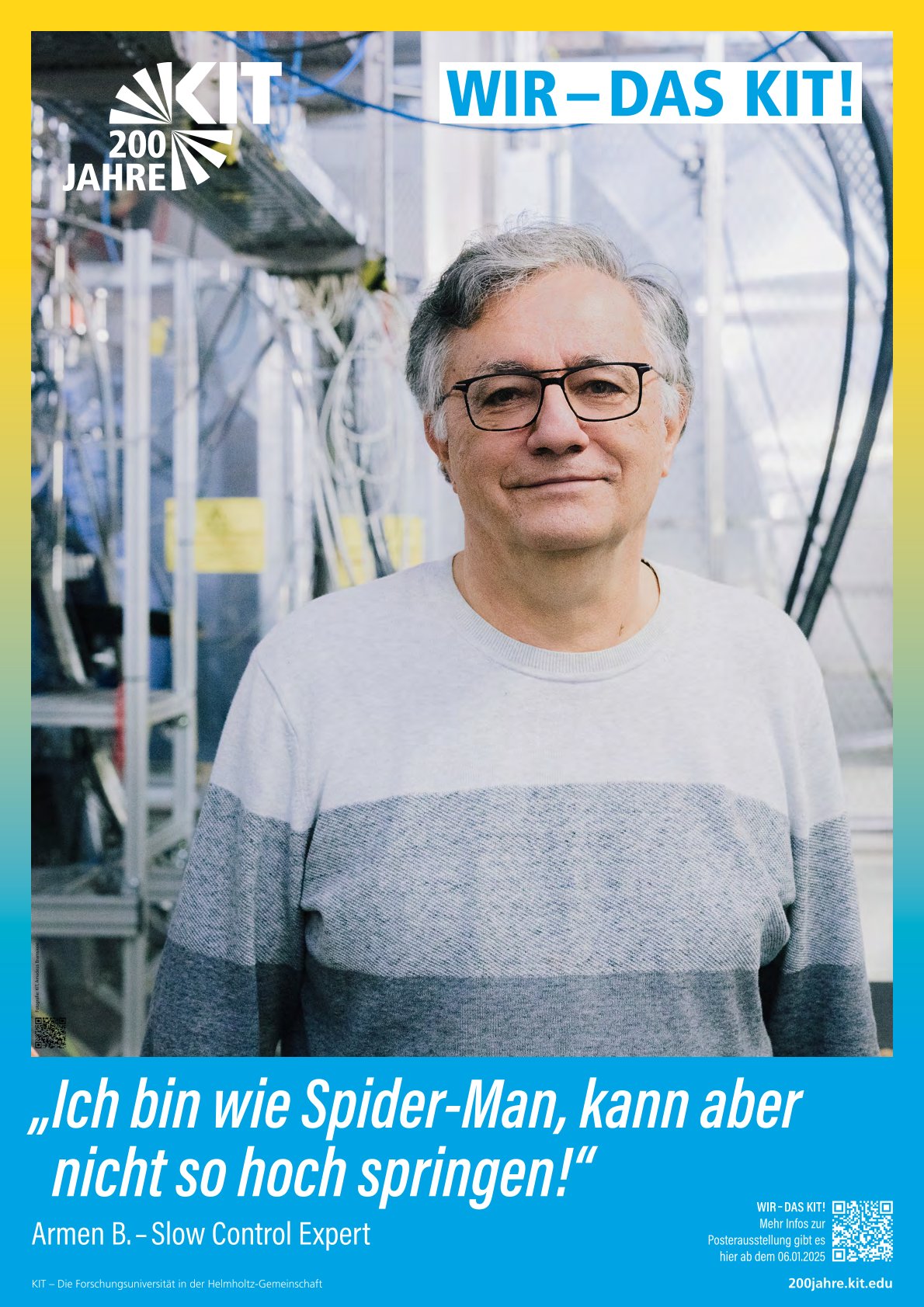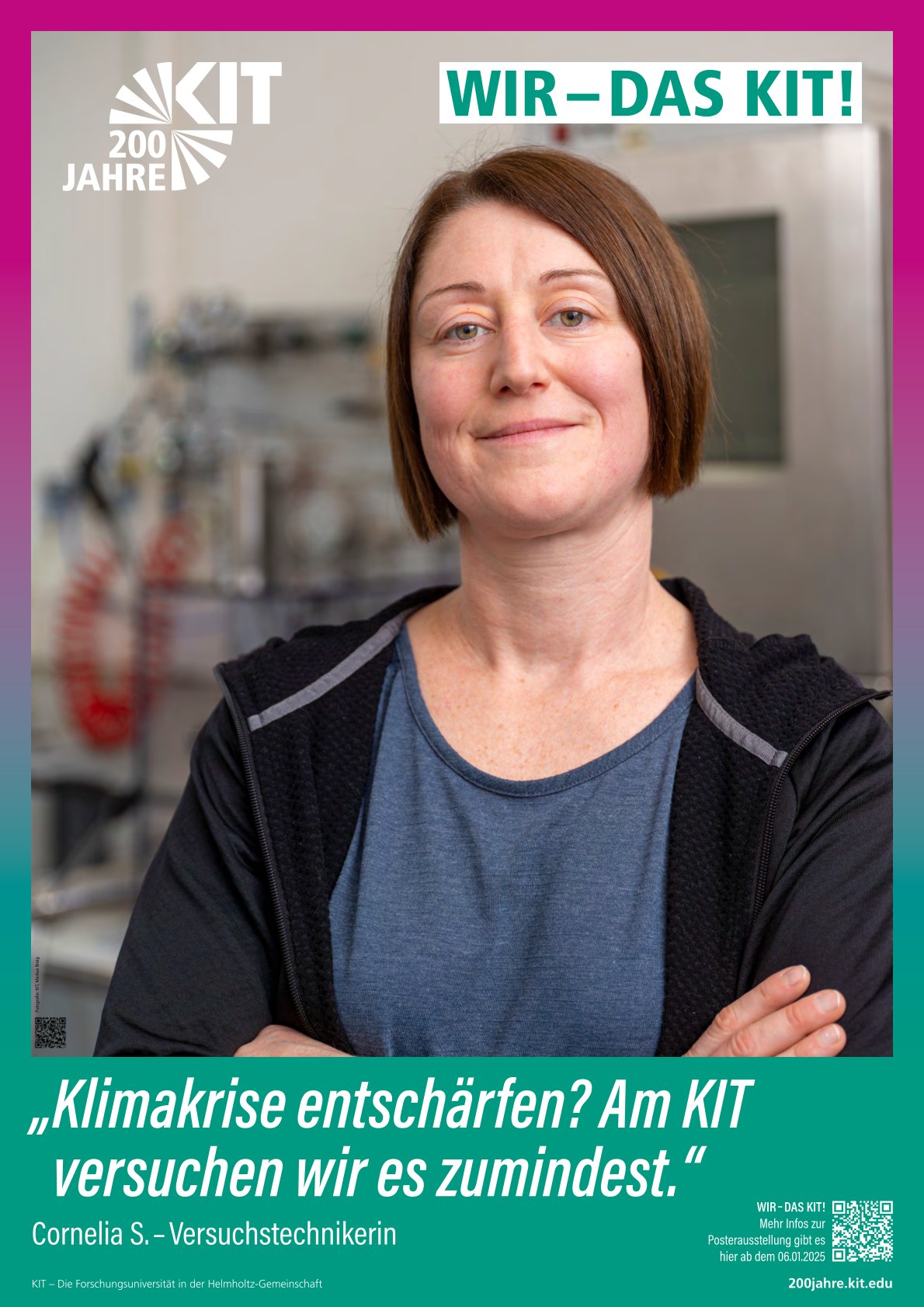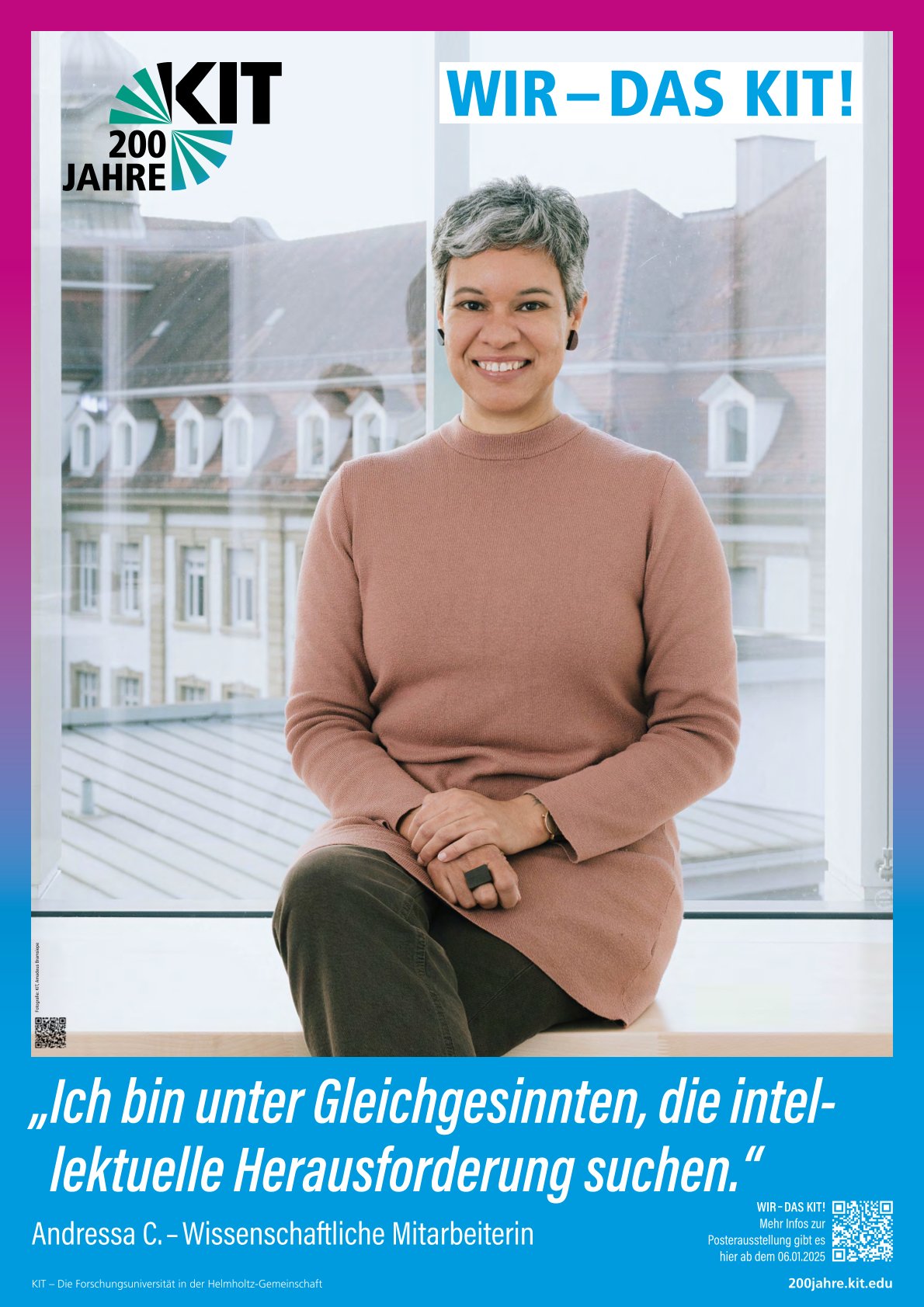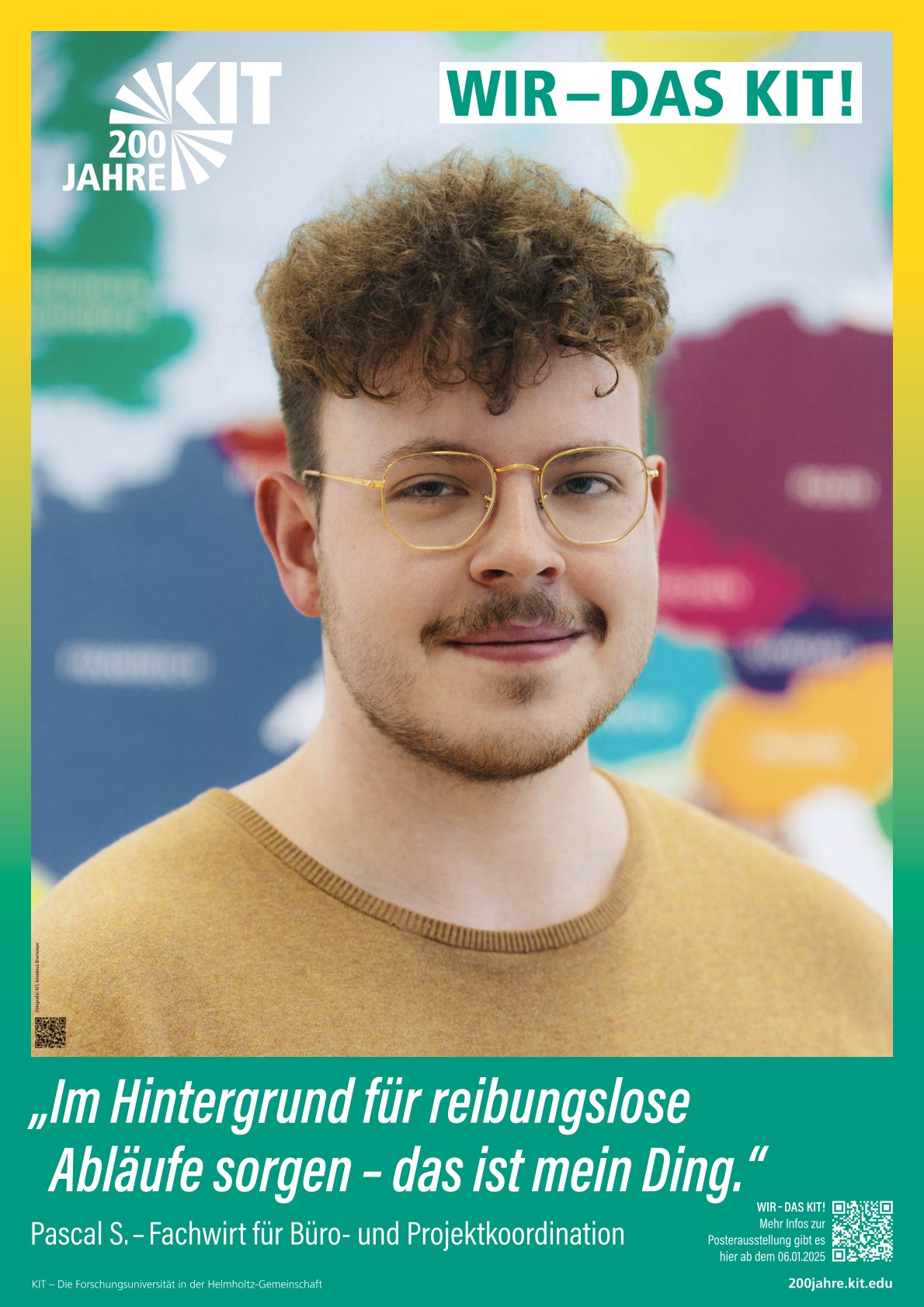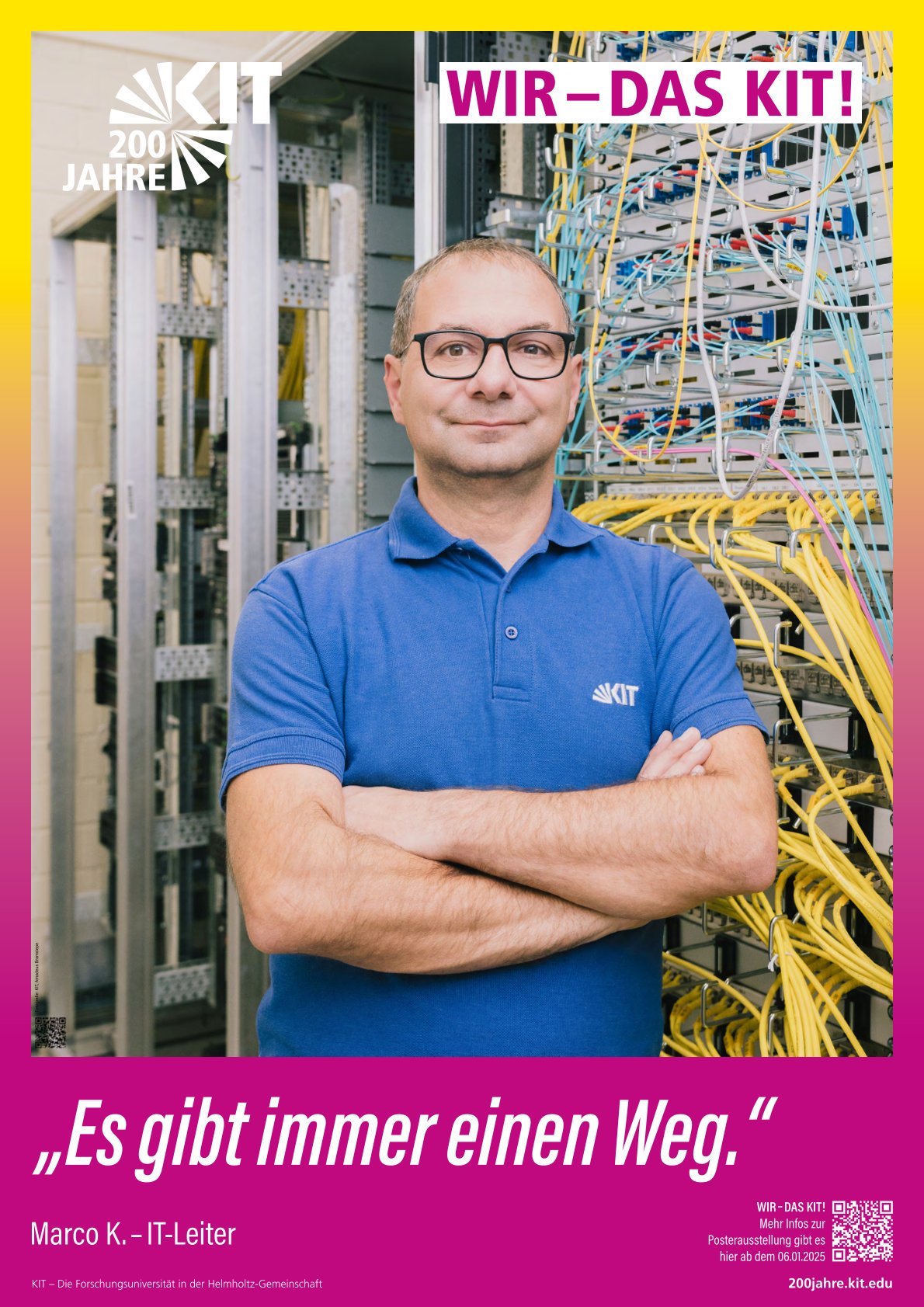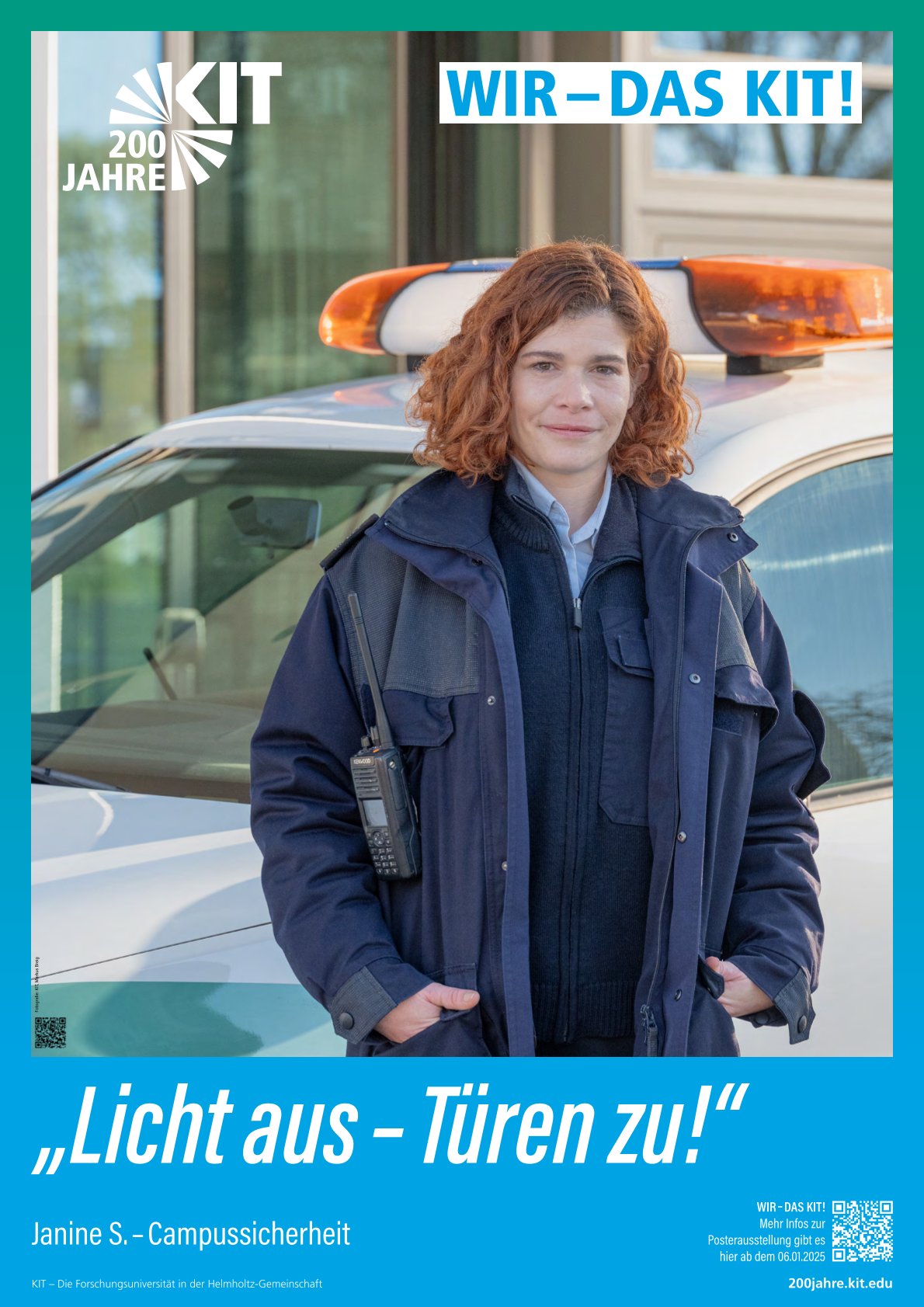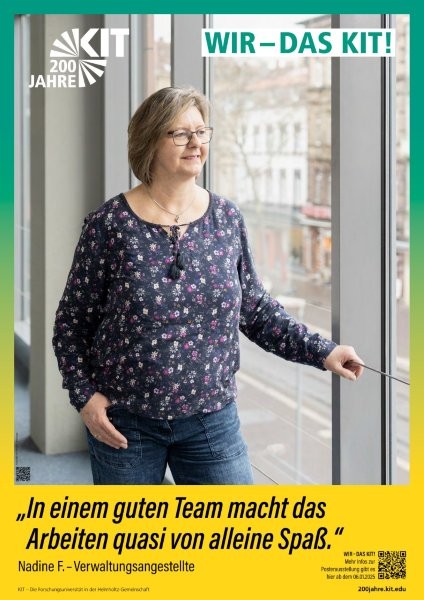We are KIT
To celebrate KIT's 200th anniversary, we launched the "We are KIT" campaign to foster appreciation and recognition within our institution. KIT employees were given the opportunity to nominate colleagues they particularly value and respect — whether for their helpfulness, contagious laughter, creativity, reliability, or positive contribution to the team.
Out of nearly 500 nominations, we selected 50 inspiring individuals to spotlight throughout our anniversary year. Each week, we'll feature one of these remarkable colleagues right here.
Get ready to discover more about KIT and the amazing people who make it all happen!
Jan
It’s been a little over a year since Jan S. Hesthaven moved from the University of Lausanne in Switzerland to take over as president of KIT. “This year has felt very short and very intense,” the Danish-born scientist recalls. He had plenty on his plate: not only the challenge of stepping into leadership of an organization with 33,000 people while it was in full operation, but also major scientific evaluations of KIT and the many events celebrating the institution’s 200th anniversary.
“I still tried to get some sleep,” Hesthaven jokes. “I need seven hours. That’s why I never go to bed later than 10 p.m. and I’m up before 5 a.m. Those early morning hours give me the quiet I need to think about fundamental questions - like what KIT should look like in ten years.”
His vision: a KIT that continues offering its students an excellent education, shows greater confidence in its strengths, and becomes even more international. “I’m Danish, so I’m naturally modest, you could say,” he adds with a wink. “But the 20 years I spent at a top university in the United States left their mark on me, and I think we’re too quiet here - especially considering how great we are. We can be proud to be part of KIT!”
During his first year, he was thrilled to see how dedicated KIT’s roughly 10,000 employees are to the success of the students, the research, and the institution itself - something he doesn’t take for granted. Now, the 59-year-old hopes to encourage more risk-taking and promote greater freedom in decision-making within the organization. He says he’s good at making decisions and revising them if needed: “At the moment of decision, I am alone. But I feel no pride in that. If, three months later, new arguments or previously unknown facts convince me otherwise, I change my mind.”
Does he miss doing research in his new role as president? Not the research itself,the professor of mathematics explains, but the interaction with students and postdocs. “In Lausanne, I once taught 300 to 400 students the basics of mathematics and scientific thinking,” he recalls, visibly moved. “Guiding such a large group of young people into a world that was completely new to them was fascinating. I truly loved it.”
Carolina
Carolina N. was searching for an exciting position as an ecosystem modeler – and found it at KIT Alpine Campus in Garmisch-Partenkirchen. Due to the pandemic, her first interview was held online. Originally from Brazil, she was already familiar with Europe through conferences and a research stay in Zurich. However, she first had to look up her new workplace on Google. “When I saw the pictures of Garmisch, I was speechless – I had been looking for a job and had found a dream!” she recalls.
In her research, Carolina combines ecosystem models with artificial intelligence to estimate the effects of climate change and land use change on various ecosystems. Her team is international – researchers from eight nations collaborate on solutions. It is important to Carolina that the results do not remain solely within the scientific community, but also have an impact on society. “We regularly organize a summer school where natural and social scientists come together. This exchange is essential to ensure that our research can be incorporated into political decision-making.”
To ensure that data and model codes remain usable in the long term, Carolina is committed to establishing a collaborative team wiki, where the group works together to develop best practices for documenting and maintaining research data. Additionally, she is engaged in providing a platform for monthly exchanges on data science topics, which is open to the entire institute. These sessions focus on current challenges in machine learning, data management and open science — and on mutual support.
Since moving to Europe, Carolina's love of nature has grown even stronger. “I discovered hiking in the Swiss Alps, and camping in the German Alps,” she says. In the summer, she sets off with her husband and friends in search of peace and solitude. She also enjoys winter: “Downhill skiing and snowboarding were too intense for me — but I love cross-country skiing!”
Jens
Cheerful, inspiring, open - that’s how colleagues describe Jens D., a technician at KIT. With his good humor and hands-on mindset, Jens has tackled plenty of challenges over the years. For example, he successfully completed the studies he had started in the GDR, adapting to completely new conditions during the time of the peaceful revolution. “Those were wild times,” Jens recalls. “But in the end, I was lucky because I was right in the middle of my training. My parents had to start over entirely.” Jens eventually found his way to KIT thanks to a newspaper ad in the Badische Neueste Nachrichten (BNN). An acquaintance spotted it, cut it out, and mailed it to him. Now - around 30 years later - he says, “I’ve never regretted moving to this region. I feel completely at home at KIT, and the area offers tons of recreational opportunities - hiking or climbing in the Palatinate, skiing in the Black Forest or the Alps, playing volleyball in a club, barbecuing with colleagues and friends - everything you could want.”
At KIT, Jens ensures that the physical chemistry lab courses at his institute run smoothly and safely. He manages the technology and experiment plans, oversees the inventory of chemicals and equipment, and serves as the go-to person for doctoral researchers when it comes to complex experimental setups. “Over the past 30 years, I’ve gained a lot of practical knowledge, so I’m always happy to offer students advice and support,” he says. This close collaboration forges strong connections: “I stay in touch with a number of colleagues in my private life, even years after they’ve graduated and long after they’ve started working in industry.” Over time, some wonderful traditions have formed. “Every year, I go skiing for a week with a small group of colleagues. We also invite former institute members to our summer parties. We’re a tight-knit group,” Jens says with a smile.
Hildegard
Hildegard S. has everything under control and is perfectly prepared: her notes for the interview are neatly organized in a blue folder.
It’s no surprise that her colleagues at the institute voted her their favorite coworker. Hildegard, an institute assistant who has been at KIT for more than two decades, is the definition of a caring, empathetic, and highly organized professional. Whether it’s arranging new chairs, managing finances and HR matters, coordinating business trips, or ordering thousands of LEGO pieces for a student lab, she always keeps a clear overview. “My job is to take administrative tasks off the shoulders of professors and researchers so they can focus on teaching and research,” she explains.
She enjoys the variety that comes with the fast-paced day-to-day life at the institute. “It takes a lot of skill, creativity, and humor to master daily challenges, often under time pressure.” When quick solutions are needed, the business professional and foreign language assistant can rely on her strong network across KIT.
She particularly values working in international teams - whether in cancer research at the start of her career or now, with a focus on practical data security and artificial intelligence. She makes sure that new or disadvantaged colleagues have a strong voice and proper representation. “I really appreciate the strong social culture at KIT -acceptance and appreciation are simply part of the environment here.” Supporting researchers in their everyday work, and thereby contributing to a better future, continues to motivate her.
She wants to do meaningful work and stay up-to-date with emerging topics. That’s why she finds computer science so exciting, with its emphasis on cybersecurity and protecting IT systems in public institutions.
Her love and dedication to family and friends, her passion for gardening to support biodiversity, her interest in cultural events, and her fondness for southern France - especially French cuisine - complete the picture. She laughs, packs up her blue folder, and heads out. She still has plenty to organize.
Marlene
“If you don’t like stress, a dual study program isn’t for you,” laughs 21-year-old Marlene N. She’s in her third year of a Business Administration degree focusing on Trade Fair, Congress, and Event Management — and she’s about to finish her bachelor’s. Over the past few years, she’s alternated every three months between hands-on training at KIT and academic study at the Baden-Württemberg Cooperative State University in Ravensburg, which has meant moving back and forth each time.
Why go through all that effort? “I get paid to study, which is pretty great! Plus, I’m not just learning theory — I’m also gaining real-world experience. That looks great on a résumé.”
At KIT, Marlene becomes a full member of the Event Management Team (VAM) whenever she’s back in her practical phase. She helps with whatever needs to be done for upcoming events, from planning to on-site coordination. “I’ve been involved in between seven and ten events each year, ranging from small to very large,” explains the Freiburg native. “In this line of work, everyone has to be flexible and able to rely on one another.”
She had her biggest responsibility in early 2025, when she managed participant logistics for an international review panel. “It was a challenge to balance legal requirements with the individual travel plans of the reviewers,” she recalls. Marlene especially enjoyed working on KIT’s open door in 2023 and 2025, as well as the “Dîner au KIT” in early July — a massive picnic for all students and staff on Campus South that ended with a dazzling light drone show. “Seeing the guests leave with a smile and knowing you helped create something that brings people together — that’s the best compliment I could get.”
Andreas
Andreas K. grew up near the Danube River. A small stream ran right behind his parents’ house — sometimes calm, sometimes wild. When the water overflowed its banks, it flooded the neighbors’ living room. For Andreas and the neighborhood kids, it was an adventure: they’d pull on rubber boots, set paper boats afloat, and head out to explore.
Did those childhood experiences influence his choice of study? “Maybe subconsciously,” he says. One thing is certain: exactly 33 years ago, he decided to study hydraulic engineering.
After graduating, Andreas spent several years in the private sector at a company that specialized in mobile flood protection. There, he developed solutions to prevent the very thing he knew from experience: flooded homes. In 2003, he returned to KIT, earned his PhD, and never left. Today, he’s not only a researcher but also the managing director of his faculty.
“As managing director, I make sure everything runs smoothly on the administrative side,” Andreas explains. What he finds especially exciting is that “within the faculty, we have the freedom to define and shape our own research topics.” And much has changed in that area: alongside traditional engineering subjects, many new fields have emerged in recent years — such as climate, environment, sustainability, and future mobility.
“Our research is much broader today, which makes us more diverse,” Andreas says. Despite all his management responsibilities, his heart still belongs to hydraulic engineering. He fondly recalls a project in Bad Kreuznach: a large-scale flood protection effort that began as a model in KIT’s test hall, was later implemented on site, and even received awards.
In his personal life, Andreas is regularly drawn to the ocean. “Watching the water is meditative for me,” he says. He’d like to get better at surfing — but usually, just sitting and watching the waves is enough to bring him peace.
Nena
This year, Nena P. is celebrating her very own KIT anniversary: She’s been part of the team for 25 years, marking her silver anniversary. “I started at KIT with a four-hour position. That worked really well for my family situation at the time,” Nena recalls.
In fact, KIT has become something of a family affair for her. Her husband also works at KIT, her daughter completed three internships there, and even the family’s beehives once found a temporary home on the institute’s roof. “We had just moved, and our new neighbors were a bit skeptical about the bees,” Nena remembers. “So the managing director at the time kindly allowed us to set up the hives on the institute’s roof for a while.” These days, the bees are back in the family’s garden and in nearby backyards, too.
Nena works in KIT’s service department, where she and her team handle room reservations and make sure there’s enough coffee and water for meetings. Behind the scenes, they keep all kinds of events running smoothly. “Good service is something that really matters to me,” says Nena. “It helps that I enjoy working with people. I’m open and cheerful.” Her motto: the customer is king. From time to time, Nena and her colleagues find themselves handling some pretty unusual situations. “We’ve mended suits and even fixed shoes - one external guest had a tear in his suit jacket, so of course we quickly sewed it up,” she says with a smile. They even came to the rescue of a visitor whose shoe sole had come loose. “Although I’m not sure he made it all the way to the main station with our quick fix,” she laughs.
Carsten
Carsten J. has been a passionate engineer for nearly 30 years. At the KIT Alpine Campus in Garmisch-Partenkirchen, he not only brings his expertise in environmental and climate issues to the table, but also serves as the department’s staff council chairman—and shares his love for the mountains with his colleagues.
Carsten grew up skiing in Saarland. “Back then, our village even had its own ski lift,” he recalls. “But it’s been shut down for a long time now because of climate change.” These days, Carsten lives and works in Garmisch-Partenkirchen, where there’s still snow in winter. “But the ski season has definitely gotten shorter,” he notes.
Outside of his job, Carsten volunteers with the mountain rescue service and spends much of his time hiking and climbing. His alpine experience is also a big part of his work at the institute. Some of the measuring equipment is located in hard-to-reach places—on tall masts or deep in the mountains. “You need a head for heights, sure footing, and solid training,” he says. He regularly trains his colleagues in how to use personal protective equipment to prevent falls—known in professional circles as “PPE against falls”.
Carsten is just as committed to protecting the environment in his free time. He teaches members of the local mountain rescue team about nature, including which animal and plant species are especially protected. His advice to all outdoor enthusiasts: “Respect nature and the weather. Cut your trip short if things start to get dangerous—don’t leave trash behind, and never toss cigarette butts!” One of his growing concerns is the increasing risk of forest fires.
What does Carsten appreciate most about KIT’s Alpine Campus? The family-like atmosphere and the chance to work outdoors. “We share our work, but also our hobbies—like hiking and skiing—and that really brings us together.”
Isabel
That’s something Isabel H. has had on her mind for years. So it’s no surprise she became a particle physicist at KIT, where she now explores some of the biggest questions in science: “It’s about the origins of the universe and about understanding why things work the way they do. It’s incredibly exciting!”
But coming up with new theories? That’s not really her thing. Instead, Isabel is part of the Belle II experiment, working alongside around 900 researchers from around the world. This is taking place at a particle accelerator at the KEK research centre in Japan. For her PhD, the 30-year-old is focusing on improving how the massive amounts of data from the Belle II detector are evaluated—using artificial intelligence. “With machine learning, there’s so much to discover and try out, which makes it fun. But it’s not just playing around—we’re tackling a real problem: filtering out all the data we don’t need, the so-called noise.” Originally from Stuttgart, Isabel has traveled to Japan three times for her research. One of the highlights of her research was working shifts in the control room to monitor the Belle II detector during particle collisions, which made the resulting data feel more tangible.
Back home in Karlsruhe, Isabel teaches programming exercises to physics students—and she loves it when her enthusiasm catches on. “I really enjoy teaching when I’ve got motivated students in front of me. Watching them improve is such a great feeling.” Her colleagues at the institute feel the same way about her. Known for her bright smile and helpful nature, they’ve even voted her their favorite coworker. And when the workday’s over, Isabel still loves to laugh—especially while playing Doppelkopf with friends. She’s already logged around 7,200 games. After all, she just wants to know.
Robert
Robert S. doesn’t take himself too seriously. The fact that a young researcher from rural Bavaria landed a PhD position in Stuttgart? “I got lucky—the institute was just being rebuilt.” That 25 years ago he contributed key insights into combustion engine processes using laser diagnostics? “Total coincidence.” That he was once voted favorite colleague? “I had just helped someone out with something important.”
Since 2004, the 56-year-old has been working at KIT, where he serves as a senior academic advisor—basically, the second in command at his institute. Despite coming from a family with ties to the auto industry, Robert never felt drawn to it himself: “Even as a kid, I was more into tricky math puzzles than the exercises in my schoolbooks. That’s stuck with me. I really value the freedom in research to take on unconventional challenges. And it’s incredibly rewarding to see your own ideas spark something in others and even lead to real-world applications.”
He’s especially fascinated by how the principles and methods of basic research stay relevant, no matter the specific technology involved. One example: his team showed how methane can be converted into hydrogen and high-quality hydrocarbons by essentially running a combustion engine in reverse. And the results were surprisingly good: “At first, we thought we’d only be able to convert a few percent of the methane. But by applying what we’d learned from combustion research, we managed to reach over 60 percent!”
It’s a promising contribution to the energy transition—and a perfect example of how spontaneous ideas that seem a little out there at first can turn into tangible technologies. That’s exactly what motivates Robert: “It’s fulfilling to know that our research and teaching can help shape a better future.”
Tomislav
Tomislav B.'s arrival at KIT turned out to be a stroke of good luck after a tough break. For over 20 years, the now 48-year-old worked on an assembly line putting together household appliances. But after undergoing three wrist surgeries, he was let go—he could no longer handle the physical demands of the job. A trained heating and ventilation technician, Tomislav decided to retrain and eventually landed at KIT through a temp agency. “I had heard of KIT, but I never thought it would be a place for someone like me,” says Tomislav, who describes himself as shy. “I thought it was just for students—some prestigious university.” But he soon realized there was a place for him there too. “At first, I walked into the buildings with a lot of respect because there are so many PhDs around. But everyone’s been really nice.” In 2024, he applied for a janitorial position at KIT—and got it. “I'm so happy to be here now,” says Tomislav. “I make less than I did in the industry, but that job made me sick. It just wasn’t worth it.”
Now, he works alongside three other team members, helping take care of the lecture halls and seminar rooms in the buildings around the Ehrenhof, and handling whatever else needs doing in and around the facilities. Whether he's on the early or late shift, Tomislav helps keep the place running smoothly: sweeping leaves or snow to keep walkways safe, handling mail, and fixing whatever breaks. When he's on the late shift and locks up the lecture halls at night, he keeps an eye out for things students leave behind. He’s seen some surprises: “One student left a bag with an iPad and laptop in it. But he never came back for it. I eventually found him on LinkedIn. It took him weeks to pick it up.”
On weekends, Tomislav, who’s originally from Bretten, often hits the road. He sings tenor in the church choir of the Croatian community at St. Paul’s in Bruchsal and St. Anthony’s in Pforzheim. Afterward, the single man likes to visit his two brothers or meet up with friends in places like Ludwigsburg or Stuttgart. “It’s great. Now that I’m working at KIT, I can finally enjoy my free time more.”
Carmen
Carmen M. is, without exaggeration, a true veteran of KIT. She began her career over 20 years ago as an administrative employee at what was then the University of Karlsruhe. And she’s played a major role in shaping what KIT is today. Carmen is one of the founding members of one of KIT’s strongest networks: the “KIT Office Network” (KIT-ON). “When the research center and the university merged, many administrative processes weren’t clearly defined,” Carmen recalls. “But both institutions had their own administrative networks, which merged in 2010 to form KIT-ON.” The goal of KIT-ON is to optimize administrative workflows, create synergies by sharing knowledge, and strengthen collaboration across administrative departments.
To support this, KIT-ON offers information sessions and workshops—and once a year, it hosts the Office Day at KIT. “In 2025, it’ll take place on October 8,” says Carmen. “The focus this year will be on advancing digitalization and artificial intelligence,” she explains. “But we also make sure that KIT employees can connect outside of the work environment through cultural events—like theater or movie nights, exhibition visits, readings, and our popular ‘Who am I at KIT?’ lunchtime meetups,” she says. “Our motto is: WIN-WIN-WIN. We want to be a win for our colleagues at KIT, a win for our employer, and as a whole, for KIT to be a win for society!”
In her personal life, Carmen’s greatest joy is her grandchildren. And whether they’re three or twelve years old, all of them know: “At Grandma’s, we dance!” Carmen converted her laundry room into a mini dance studio, complete with a sound system and disco ball. “My husband and I also go dancing regularly to stay fit,” she adds with a smile. “But for that, we hit a real dance floor,” she laughs.
Heba
Science knows no boundaries. That’s how computer science student Heba K. left the University of Aleppo in 2010 to pursue her PhD at KIT. What was meant to be a four-year research stay turned into 15 years—because war broke out in Syria in 2011.
Building a new life in Karlsruhe was difficult. “But at KIT, I found my new academic home,” says Heba. Excellence is a top priority here, along with the desire to make a positive contribution to society through high-impact research—exactly what has always driven the postdoctoral researcher.
Her current research focuses on how artificial intelligence can be used to optimize the performance and energy consumption of small electronic devices—such as smartphones.
In addition to her research, which she loves, Heba is dedicated to teaching and mentoring students. As a research group leader, she recently supervised her first student through to completion of his doctorate. “That makes me very happy—and I was also touched that he chose me as his favorite colleague! It’s important to me to support and inspire the next generation of scientists—especially women—to pursue their ambitions with confidence and to see themselves as part of a global scientific community, regardless of their background.”
Diversity is a lived reality at KIT, says Heba. In her 15 years at the institute, she has not personally experienced discrimination. “I want to emphasize this especially for international students: you can express your identity here. This right is respected and protected at KIT.”
In her free time, the computer scientist enjoys swimming at the KIT pool or hiking with her husband and two sons. Her next goal: her habilitation - as a step towards becoming a professor one day.
Andreas
Fixing old measuring equipment? Check. Setting up lab sessions for students? Check. Organizing exams and designing learning modules in chemistry? Check.
Andreas R. is a doer, a mediator, a problem solver—someone who seems to be there for everyone and everything at his institute. And it’s no surprise: the 57-year-old knows everyone, and just about everything, at KIT. His life and career are deeply connected to the institution. He’s been part of KIT since 1989—first as a chemistry student, then as a PhD candidate, and now, for many years, as a civil servant supporting students, teaching, and research. “After my first chemistry class in school, I knew I wanted to study chemistry,” he recalls. “Chemistry is when things smell and explode—like fireworks! That still fascinates me to this day.”
Over the years, countless students have pored over his lecture notes or gained hands-on lab experience through courses he helped reshape to be more research-oriented. His dedication hasn’t gone unnoticed. In 2024, students honored him with the Faculty Teaching Award. For Andreas, it was a meaningful highlight in his career: “When I see that moment on students’ faces—when the lightbulb goes on—I know I’ve done something right.” And recently, he was even voted “favorite colleague.” That, too, brought him joy: “It really made me happy! But for me, helping others and being there for them is just natural. I consider it a privilege to give people my time.”
Industry was never an option for him. “Pushing buttons on a machine all day? Not for me,” he says with a laugh. When his workday ends, he leaves the lab behind and looks forward to spending time with his wife and daughter—and getting outdoors as often as he can. “I escape the city and head into nature,” he says. That’s where the chemistry feels just right for him, too.
SaeBom
SaeBom S. is passionate about cities, people, and diverse cultures. As an urban planner, she has studied a wide range of cities and societies in South Korea, South Africa, the United States, and Germany. She earned her master’s degree at KIT about ten years ago. After working in various roles in the private sector, she returned to KIT two years ago to pursue her Ph.D.
“During the pandemic, countries took very different technological approaches—for example, using apps to track infections or assess personal risk,” SaeBom recalls. “The level of trust in these technologies and the way data security was perceived varied greatly—South Korea and Germany are good examples of that contrast. That inspired the topic of my doctoral research.”
Even though the pandemic is behind us, the digitalization of daily life has continued to accelerate. Digital mapping tools have long been a standard in urban planning, but the way urban planning is integrated with personalized services still varies widely from one society to another. “Targeted data collection could benefit areas like transportation, energy, and overall quality of life in urban neighborhoods,” SaeBom explains.
A thorough needs assessment plays a major role in this. It allows urban planners to better accommodate communities with specific needs—such as neurodivergent individuals, older adults, and people with disabilities. “A solid needs analysis is key to designing a truly inclusive campus here at KIT,” says SaeBom. “For example, designated quiet areas with low-stimulus environments and expanded counseling services could help reduce dropout rates among students facing physical or mental health challenges.”
SaeBom finds her own peace of mind in spending time with friends, having deep conversations, and cooking together in a warm, cozy atmosphere.
Nehal
Like many of her female friends back in Egypt, Nehal A. chose to study a technical subject. “At the German University in Cairo, where I earned my bachelor's degree, women now make up the majority in computer science,” she explains. For the past two years, Nehal has been working on her doctoral thesis at KIT, focusing on so called “R-strategies”. She uses AI-based models to support decision-making on the reusability of mechanical parts in returned products. This helps enginees to make informed decisions about reuse, remanufacturing, reprocessing, or recycling in the circular economy.
“One example is the smart reuse of mechanical parts or machine elements instead of scrapping them,” she says. “Take screws or bolts, for instance—why not reuse them in other products once a component reaches the end of its life?”.
Nehal has some advice for women in Germany who often find themselves outnumbered by men in technical discussions: “Speak up! Don’t be shy—join in and make your voice heard. You’d be surprised how much respect that can earn you. I hope my story inspires more girls to pursue engineering,” she says.
What Nehal appreciates most about Karlsruhe is its perfect size—not too big, not too small. “I especially love the international atmosphere here,” she adds. On weekends, she and her husband enjoy going to the cinema or gather for a good meal with friends. “I love to organize cooking nights to celebrate cultural exchange with my colleagues. That way, I learn how to make Käsespätzle, and my colleagues get to try the traditional Egyptian dessert Om Ali. It’s a win for everyone,” she says with a smile. In her free time, she also enjoys yoga, baking, painting, macramé, and drawing — activities that help her relax and recharge.
Julián
Julián S. is someone who doesn’t leave things to chance. When the Colombian decided to move to Germany with his girlfriend to pursue a PhD, he spent three full months doing his homework. He dove deep into the scientific community in southern Germany—reading up on research groups, their projects, open positions, and even scrolling through social media posts from the most interesting group leaders. Julián is convinced: “In research in highly developed countries, it’s not about the university itself—they all have amazing infrastructure and resources—it’s about the people.” In the end, he sent exactly two emails. One of them landed him a spot in Professor Levkin’s lab at the 3DMM2O Cluster of Excellence at KIT.
Since 2023, the 29-year-old has been working on developing new, high-performance materials for culturing cells in the lab. “I just think it’s cool that you can control crazy biology with crazy chemistry!” For Julián, his time in the lab is a gift he’s giving himself. He already filed two patents during his master’s studies and could’ve jumped straight into industry—but he couldn’t let go of the unique atmosphere that research offers. “I didn’t want to look back and regret not doing a PhD,” he says.
He’s got about a year and a half left to finish his doctoral work at KIT. Until then, he continues to light up the lab with his good humor and down-to-earth personality. His international teammates have even voted him their favorite team member. “It’s really nice to know I make them a little happier,” he says. As for what’s next after his PhD, Julián is keeping his options open. But he’s definitely thinking about staying in Europe, maybe even in Germany, to work in applied research. “It’s a great country, and the people are genuinely kind,” he says.
Ersin
Numbers, data, and analysis: that’s what drives Ersin K., 37. A certified industrial clerk and business economist, Ersin works in Controlling within the Human Resources (HR) Department at KIT. His responsibilities include ensuring that HR processes are correctly implemented and budgets are on track. “In this role, I interact with people from all across KIT. It’s exciting, even though we face ongoing challenges due to limited staffing,” he says.
Ersin has been with KIT since 2019, after working for several years in the private sector. His position here brings him a deep sense of pride and for good reason. After an accident at the age of four left him paralyzed, Ersin attended a special needs school. Despite his desire, he was never given the opportunity to join a mainstream school, not even for a single year. “I earned my vocational diploma and completed my training, but I couldn’t study at KIT. Now, I work here. That feels incredible like I’ve defied the odds.”
As integration officer, Ersin is committed to giving back, to both the institution and the people at KIT. He’s passionate about creating an inclusive, supportive workplace culture. Even if you earn a little less, he says, people with disabilities are better off in the public sector than in the private sector: “Thanks to KIT’s duty of care, you’re not just a number here — you’re seen and respected as a individual. Inclusion isn’t just a buzzword here. That kind of care shows what’s truly possible.”
Outside of work, Ersin loves spending time with his wife and two-year-old child, traveling, or heading out on his hand bike when the weather’s nice. “I like to push my upper arms to the limit,” he says with a smile. “To me, limits are signs showing you the way forward.”
Heike
Three individual nominations and one group nomination as “favorite colleague”—that says a lot about Heike. Since joining her institute in 2020, her tireless dedication, sharp sense of humor, calm under pressure, and readiness to help anyone who’s struggling have made a big impact. “To hear from so many coworkers that they appreciate me—it made me incredibly happy,” says Heike. “Warmheartedness like that can’t be measured, but it gives me so much strength.”
As a senior engineer, the 49-year-old PhD is the right hand of the department’s professor. She handles a wide range of responsibilities: overseeing administrative tasks, offering technical support to students and PhD candidates, giving lectures, and serving on the faculty’s examination board. She also keeps an eye out for students going through tough times, always looking for ways to support them. She speaks from experience. At age 28, Heike started studying economics as a single mom of three young children—while working part-time. “Having people around you who are kind and supportive is so important when you’re dealing with challenges like that,” she says. “But I also know you have to put in the work and, more than anything, stay persistent.”
One of the things Heike values most about her job is the creative freedom. She’s able to decide when, where, and how to bring new ideas to life—whether that means launching a project, reworking a lecture, or trying something completely new. “Research needs freedom. Without it, it just doesn’t work,” she says.
The Palatinate-by-choice enjoys spending her free time with her now nearly grown-up daughters and close friends. She also loves heading out into the woods on her own—whether it’s to hunt or train her hunting dog. This allows her to switch off completely: “There’s just no reception out there.”
Stefan
Stefan K., workshop manager at KIT, was one of the first people in Karlsruhe to see Mika, the baby polar bear, up close. His institute supports the Zoological Garden with data analysis to monitor the young cub’s growth. This required the installation of a monitoring system. So there was Stefan—standing on a ladder, screwdriver in hand—with the massive polar bear mom just behind a thick pane of glass, when he caught his first glimpse of the cub. “We were even allowed to take a few photos for the family—but were asked not to post them on social media. Of course, I respected that. It’s a matter of principle,” Stefan says.
Stefan has worked at KIT for over 20 years. “I did my apprenticeship back when it was still the Technical University. After my military service, I went into industry,” he explains. But he eventually returned to KIT. “I was determined to continue my education and grow in my career,” he says. “KIT gave me the chance to become a certified master craftsman in precision engineering, and that convinced me.”
Today, Stefan manages the workshop and works as a master craftsman at an institute focused on electronic systems and microsystems technology. He helps students, PhD candidates, and researchers build and set up their experiments. He also designs and builds prototypes and models used in research and showcased at major trade fairs and conferences. “The topics covered at the institute range from automotive and sensor technology to telecommunications and medical technology, so my work is just as varied,” he says. Stefan adapts vehicle sensors, designs housings for sensitive measuring instruments, and constructs driving simulators and setups for testing visual acuity.
“In a research environment, things are always exciting!” he says with a smile.
Johann
If you had to name just one person, it would be him. Johann S. is KIT's "Mr. Disability Representative.” The IT expert has been dedicated to improving working conditions for employees with disabilities since 2010. Since 2016, he's been doing it full-time. At 61, he leads a five-person team and spends each day reviewing applications, developing solutions, and building support networks. His mission is to provide the best possible guidance to those who need it. “When you’re dealing with health issues, it makes a huge difference whether you have someone standing beside you or if you're left to fight on your own,” Johann says.
He learned that lesson firsthand back in 1988 when he started his training as a mathematical-technical assistant at the Karlsruhe Research Center. When his request for a parking permit was initially denied, he realized just how important it is to have a representative for people with disabilities. Not long after, he ran for the role himself.
Today, around 300 employees at KIT—roughly 3% of the workforce—are officially registered as disabled. That’s below the legally required 5%, which means KIT pays a compensation fee of about €500,000 a year. But Johann isn’t in this fight just to avoid fines. For him, inclusion is a core part of a democratic society—everyone should have the opportunity to use their talents, regardless of their limitations.
Johann is living proof. He spent many years working as an IT administrator at Campus North and now travels between all KIT locations. At the same time, he’s been going to a clinic three times a week for five hours at a time for dialysis—and has been doing so for years. “Working with a disability is absolutely doable,” he says. “You just need the right conditions. And there’s always plenty to do!”
Sylwia
Sylwia H. has been part of the KIT team for 15 years and is known for her uplifting, positive energy. Her coworkers say she makes the best coffee on Campus North. And many also credit her with showing them what reliable, high-quality service looks like and how to achieve it for free and in a fun way.
"Good moods are contagious - I see that here every day," Sylwia says.
One of Sylwia’s favorite tips for creating positive connections: She uses the 30 seconds it takes to make an espresso as a chance to chat with others. “We talk about everything - weather, kids, work - just whatever comes up while the coffee’s brewing.” Her presence at the coffee counter has become such a staple that people notice right away if she’s not there. “After I was off work for a while following a bike accident, so many people asked where I’d been and how I was doing when I got back. That really meant a lot to me,” she shares.
Sylwia enjoys her coffee with a splash of a lactose-free milk alternative, like pea protein milk. “It’s awesome how many options there are now—even for people with allergies,” she says. Outside of work, Sylwia is just getting into the world of fitness. “Now that my cycling injury has healed, I want to start jogging more regularly,” she says. She’s also a big fan of hiking and skiing, and often spends her vacations in the mountains with her family, including her mother-in-law and their family dog.
Qiucen
Qiucen T. smiles—she’s always smiling—and says, “I have my dream job here!” Then she smiles even wider. She knows that her current life has been shaped by a series of unexpected twists and turns.
Back in college, Qiucen never imagined she’d end up studying in Germany. But then she met a group of exchange students from Aachen at her university in China, and they became friends. Later, when she decided to apply for a master’s program in Aachen, her application arrived too late. As a backup plan, she enrolled at KIT in Karlsruhe. Just two days after she arrived, she met another student who would later become her husband. So instead of moving to Aachen, she stayed in Karlsruhe. Now 29, Qiucen laughs and says, “Whatever happens, happens. I'm open to all possibilities in life.”
Today, she’s a PhD student working her dream job in electrical engineering. At the Energy Lab, she’s researching how the power grid can better integrate renewable energy sources. “The goal is to regulate voltage and frequency and develop an asynchronous grid—something completely different from today’s standard model,” she explains. It’s a topic that comes with a lot of questions and skepticism—but Qiucen welcomes it. “I don’t see that as criticism or a problem. I see it as a valuable chance to discuss and improve.”
She brings that same open-mindedness to her research group. “In China, we see our fellow students as brothers and sisters in learning. That’s why we call each other that—but in Italian! We say ‘sorella’ and ‘fratello.’ Some of my colleagues studied in Italy, and our boss is Italian too.”
Qiucen has truly found her place among the researchers in her team. “I’m so grateful that my colleagues are also my friends. We support each other, we understand each other, and we can talk about anything. After lunch, we always play foosball. We’re definitely the loudest group at the institute! I feel so fulfilled because I get to spend my life with these people.”
Isha
Exactly the right career decision: In her second year of training, Isha S. knows that she has chosen the right profession: “In addition to typical tasks such as secretarial and office management, I also work a lot with numbers. This is because project budget management and controlling are part of the training,” she says. “I've always been good with numbers – that suits me very well.” Isha came across KIT rather by chance: “My classmates and I knew that you could study at KIT. But we found out that KIT also offers a wide range of vocational training programs during career counseling,” she recalls. She finds the technical environment at her institute exciting. “During presentations on scientific topics, we trainees are often allowed to listen in to gain an insight into the work of our colleagues,” reports Isha.
She also enjoys passing on her experience. On the one hand, she provides advice and support to the second trainee in the office, who is in her first year of training. On the other hand, she has joined the organization team for the onboarding of new trainees at KIT. Last September, KIT welcomed 84 new trainees in 24 industrial, technical, scientific, and commercial professions. During several introductory days, the new trainees got to know KIT and the campus. The onboarding team, of which Isha was a member, organized campus rallies, sports activities, team exercises, and a trip to the Tripsdrill adventure park for the new arrivals.
In her free time, she enjoys long hikes in nature as a balance to her everyday office life, or spoils her family and friends with homemade brownies and muffins. Her colleagues at KIT have also benefited from her baking skills. A real win-win situation.
Martin
Martin M. plays a crucial role in ensuring the safety of everyone involved in one of KIT’s most cutting-edge experiments. The KArlsruhe TRItium Neutrino Experiment—known as KATRIN—is focused on measuring neutrinos, some of the most mysterious particles in the universe. Spanning about 79 metres in length and standing nearly 12 metres tall, KATRIN is essentially the most precise scale on the planet.
The experimental hall and adjacent laboratories contain countless cables and physical measuring instruments, as well as several levels connected by steps and partially secured by barriers.. Martin knows the space like the back of his hand.
“Depending on what experiments or work are going on at KATRIN, I’m on-site every day to make sure employees and students are fully briefed in all aspects of safety,” he says. He constantly scans the area for potential hazards—everything from fall risks and strong magnetic fields (which could interfere with pacemakers), to electrical dangers and exposure to hazardous substances.
Martin makes sure his colleagues complete an annual online safety course, are trained in handling hazardous substances, and regularly attend first aid classes. “I can be pretty strict,” he admits. “But ultimately, it’s about keeping our people safe.”
Despite the serious nature of his work, Martin enjoys the collaborative and collegial atmosphere at the institute. He’s also deeply inspired by the science taking place around him. “Neutrinos and dark matter inspire me to think about creation,” says Martin, who is actively involved in his local church along with his family. “At the institute, I can always chat with the physicists, and I’m involved in various projects. It’s that blend of personal curiosity and professional commitment that keeps me coming back to KIT.”
Heike
From intern to business administrator—Heike K.’s journey at KIT began nearly 20 years ago with a simple internship. That experience led to a part-time position, and since 2011, she’s been working full-time in the administration department. During this time, Heike also raised her three daughters as a single mother. Once they were grown, she decided to study part-time and earn her degree in business administration. “I didn’t have holidays, weekends, or any free time during that period,” she recalls. “But I was determined to move forward.”
In her administrative role, Heike manages third-party funding and handles accounting, financial controlling, and contracts. She also oversees the institute’s trainees—something she truly enjoys. Working at KIT means seeing many young researchers come and go, especially Ph.D. students. “I’m always happy to help and make sure everyone settles in quickly,” Heike says. “Sometimes you even reconnect years later,” she adds with a smile. “One of our recently appointed professors actually worked here years ago as a doctoral student.”
Outside the office, she manages the website for a large gymnastics club in Karlsruhe and serves as treasurer for the local allotment garden association, where she’s been growing her own fruits and vegetables for the past two years. Heike also regularly steps in as a children’s and apparatus gymnastics coach. “I’ve been involved in kids’ gymnastics since my youngest daughter was three,” she shares. “Now she’s a coach herself.”
But for Heike, the best way to relax is in her garden. “I grow tomatoes, pumpkins, strawberries, and blueberries. The fruit trees need care too,” she says. “It’s incredibly peaceful being out in the fresh air, surrounded by nature. It’s the perfect way to unwind after a day at the office.”
Suzan
Suzan has a passion for exploring historical contexts—especially the relationship between "the Orient and the Occident." A native of Karlsruhe, she is just as interested in the present: "My seminars at KIT focused on gender studies, modernization theories, and Islamic feminism," says the historian, who holds a PhD.
Her vision is to help foster a democratic culture—not only to advance academic research but also to make KIT a place where everyone feels welcome and enjoys being. As the appointed anti-discrimination officer, Suzan is dedicated to identifying and actively counteracting discrimination.
Even outside of work, education remains a central focus for her. In her free time, Suzan is involved in youth work that promotes dialogue among young people. "The risk is that people stay in their own bubbles and only recognize values that reflect their immediate surroundings," she explains. "It's essential to keep the conversation open so we can talk about shared values."
She adds, "I hope that this dialogue helps people truly see one another—regardless of their background. I've been lucky to meet such people during my studies and now also here at KIT."
Suzan finds balance in nature. She enjoys hiking and recently got into horseback riding through her children.
Her biggest dream is to complete her postdoctoral qualification. She’s already written the first 300 pages. “Even if I only manage to write three more lines between work, family, and volunteering, doing academic research brings me joy and fulfillment,” she says.
Sophia
Sophia S. has a kind of magic: her coworkers swear that her contagious laugh can turn a Monday morning into a Friday afternoon. But that’s not her only superpower—she can make the invisible visible! All she needs is an X-ray machine. At her workplace at KIT, she uses it to demonstrate radiation protection to employees and external clients. As a medical technologist specialising in radiology, Sophia knows these complex machines inside and out.
“As a healthcare professional, where do you receive the least radiation exposure during an X-ray procedure?” she often asks during hands-on sessions. “Surprisingly, most people get it completely wrong—even those with years of experience,” she says. “That’s why legally mandated radiation safety courses are so important. Being able to help ensure safety during medical procedures really gives me a sense of purpose,” she adds.
As a course technician, Sophia oversees the practical training, maintains the X-ray equipment, and works with her colleagues to help shape the course content. “We’re a great team—everyone brings their own area of expertise. It’s like a perfectly built puzzle,” she says.
In her free time, Sophia loves bringing joy to others. “I enjoy baking and working with my hands, so I often bring in homemade cakes or other treats,” she says. Music also keeps her in a good mood: “I love going to concerts of all kinds—and I really love to dance!”
Mario
Mario P. could be working in Australia, Finland or Uruguay. But after spending years abroad, he made the decision to return to Germany and take a job at KIT’s North Campus. “Working overseas was exciting, but after a while, I didn’t want to be away from my wife for so long,” he says. That’s when he came across what he describes as a “really great” job posting with the Welding and Testing Technology team. Nearly five years later, the 37-year-old still enjoys his short commute from Neureut, a supportive team, and the interesting challenges that come his way from various departments across the institutes. “The institutes often bring us complex tasks,” he explains. “Sometimes we need to weld different materials together, or modify pipes and containers so they can handle extremely high pressure or ultra-low temperatures.” Whether it’s cutting-edge laser and electron beam welding or classic tungsten inert gas welding, Mario brings his skills to bear — and enjoys every minute of it. “We also consult and aim to deliver the best possible results for our clients. It’s a lot of fun!”
Working at a scientific institution feels meaningful to him. Even though he’s not directly involved in the research itself, he knows he’s contributing to a better future. In his free time, Mario enjoys working in his garden or traveling the world — these days, always with his wife by his side.
Josiane
The year 2025 is a special milestone for Josiane F. — it marks 40 years since she began her professional journey. On January 1, 1985, she started working as a trained translator from France at the Technical University of Karlsruhe. Just four years later, she embraced a new opportunity: helping to establish the German-French Institute for Environmental Research. “One of the great things about KIT is that you're not locked into the same role forever — you have the freedom to grow and evolve,” Josiane says. Today, she oversees administrative operations for two institutes at KIT. Her responsibilities include managing the finances of over 30 third-party funded projects, overseeing budgets, preparing contracts and tenders, and coordinating acquisitions. What Josiane enjoys most is the constant flow of young researchers coming and going — PhD candidates and postdocs who bring fresh energy and ideas. “Every generation is exciting and brings new ideas. There’s no room for routine,” she says with a smile. Looking ahead, Josiane hopes to see more diversity and digital transformation at KIT. “KIT is a role model in many ways, but there’s still a lot to be done when it comes to digitalization,” she notes. In 2026, Josiane will retire — and she’s already making plans. With a strong interest in geopolitics and a passion for reading, she’s looking forward to traveling more. “Scotland, Japan, and Bhutan are at the top of my list,” she says. She’s also considering volunteering at a library — a perfect fit for someone who loves literature, meaningful conversations, and meeting people from all walks of life.
Felix
Always on the move — that’s how Felix B. imagines the perfect vacation. Think cycling from Lake Constance to Istanbul, catching up with friends along the way, or striking up conversations with strangers over a garden fence. After graduating, he hit the road on his bike and pedaled across the Alps toward Turkey. “I planned the route myself and tried to stick to quiet backroads,” Felix says. “But in Bulgaria, we had to ride on the highway for a short stretch — which, oddly enough, wasn’t actually prohibited in some parts.” He laughs as he remembers Istanbul, where a so-called side road turned out to be a high-speed truck route leading to the airport construction site. “That part was dusty and intense,” he recalls.
At work, Felix keeps his colleagues at the KIT just as energized. During a company outing, he spontaneously asked who wanted to take a "little detour" over the nearest mountain peak with him — a challenge that ended with a surprising show of endurance from the group. For Felix, sports are the perfect counterbalance to office life. As a legal advisor at KIT, he handles all kinds of contracts and consults on a broad range of legal issues. “It’s more interesting than it might sound,” he says. “You get to cover everything from solar energy research to mechanical and electrical engineering, and even chemical and pharmaceutical research. I feel really fortunate to be able to exchange ideas with scientists and learn something new every day.” In his personal life, Felix is also eager to keep learning — he’d love to pick up a new language or two, like Italian. His ultimate dream would be to cycle from Karlsruhe all the way to China — in a time of peace.
Anne-Sophie
Some of Anne-Sophie’s colleagues believe the institute wouldn’t run as smoothly without her. As an assistant to the institute’s management, she handles appointments, supports various projects, answers all sorts of questions, and serves as the main point of contact for doctoral students. Her colleagues often say that she “always goes the extra mile to find practical solutions for everyone.”
Anne-Sophie joined KIT just under ten years ago after transitioning from the private sector. While adjusting to the academic world, she also completed her bachelor’s degree in International Management part-time. “This extra training has been really helpful, especially with the international focus at KIT,” Anne-Sophie explains. “It’s particularly useful when collaborating with partners, like those in China or across various European institutions.” She’s also close to finishing her part-time master’s in Digital Management and Transformation. “I love the variety of tasks and the opportunities KIT provides me,” she says. Her master’s thesis will cover a topic directly relevant to the institute. “It’s a classic win-win situation,” she adds with a smile.
In her limited free time, Anne-Sophie enjoys spending time in nature, watching football at the KSC stadium, or practicing dressage. She finds that working with horses is particularly grounding: “When riding, you have to be 100% focused on the horse, without thinking about anything else. That’s the only way to create harmony. It helps me completely switch off from work and studies.”
Katharina
Katharina B. moved to Karlsruhe nearly 20 years ago to study mechanical engineering—a natural choice for her, given her love for physics and math in school. After graduating high school in Schleswig-Holstein, she had the option to study aeronautical engineering or shipbuilding. “But Hamburg wasn’t far enough away at the time,” she says with a smile.
Today, Katharina leads a department at KIT, focusing on automated and connected mobility, as well as medical and health technology. “Even back in college, I was passionate about product development, design, and humanoid robotics,” she recalls.
One of her team’s current projects involves forensic medicine. “It can be extremely difficult to determine whether the death of an infant or toddler was accidental or caused by something like shaken baby syndrome. We’re working with the Institute of Legal Medicine in Heidelberg to help close the data gap with the help of new validation approaches and the development of dummies,” Katharina explains. “As head of department, I am responsible for creating good working conditions so that the team can develop freely and implement projects in the best possible way.”
To unwind, Katharina enjoys running, hiking, and gardening—especially growing tomatoes and chili peppers. “They end up in tasty sauces and stews. I love cooking—it’s the perfect way for me to relax after a busy day.”
Davide
Davide G. is always up for a crazy idea, or – to use his own words – he helps create "a good atmosphere at work." Here's an example from last year: "A few of us from KIT rented city bikes and rode all the way to Hornisgrinde. It was 160 kilometres round trip, with 1,600 meters of elevation gain. It was so much fun!" Did the expert in flow simulation consider his position on the bike during that trip? Absolutely! “In my field, computer models are incredible tools for visualizing things you can’t actually see—like air currents. It's amazing that we can simulate how pollutants spread through the atmosphere or how heat moves through a room. It’s so exciting! ”When he’s not researching the aerodynamics of bodies, the 38-year-old is teaching—and he’s been doing that for 10 years now. He came to KIT after studying in Milan and earning his PhD in Darmstadt. "Teaching young people is incredibly meaningful to me. I really feel like I have a positive impact on my surroundings. And it’s awesome to see so many students choosing to do research in the same field!” Davide plans to stay at his institute for the next few years, continuing to foster a great atmosphere—and making sure the cake trays don’t stay full for long:
“I’m kind of famous for my appetite! So if there’s cake in the kitchen, you’d better grab a piece before I do!”
Karl-Heinz
When Karl-Heinz G. first walked through the gates of what was then the Nuclear Research Center – now known as KIT's North Campus – in February 1980, he had just finished his training and simply wanted to 'take a look' at this so-called 'Holy Grail' of research. Forty-five years later, he's still there, smiling: "I'm still proud to be part of it." Karl-Heinz thinks he knows everyone and everything. He's worked in loads of different areas over the years, from radiation technology and plant safety to purchasing. Now 64, he's spent more than 30 years in procurement, and though he could retire, he's decided to stick around a bit longer. He's going to spend the next year training his successor in all the different parts of the job. "My coolest purchase was the hydrogen bus that shuttles between the KIT campuses. I also bought the container for the KATRIN neutrino detector and a few buildings, too! These days, the group leader doesn't get nervous signing contracts – even when they're for entire lab buildings costing eleven million euros. But he still gets a good feeling when he walks across campus and sees the things he helped bring there: "Purchasing is a key aspect of everything we do!" He tries to share that enthusiasm with the younger ones, organising tours of the institutes to show how the things they buy are actually used in research. "In industry, money's made in purchasing. But that's not the case here. We just want to buy what's best for science."
Gunther
Gunther S. left KIT for a while, but ended up coming back. The computer scientist studied at KIT, then worked in the private sector for a while, before eventually returning – because he was so passionate about science. As a digital privacy expert, Gunther believes knowledge should be shared openly and made accessible to everyone for the benefit of society. But for him, it’s not just about having knowledge—it’s about putting it into action. He’s the kind of person who dives deep into complex topics so he can represent academic staff effectively in KIT’s convention and committees. At his institute, the 58-year-old not only teaches but also supports his colleagues in securing research funding so that they can focus on their work the stress of financial uncertainty. “I’ve been at KIT for nearly 25 years, and I want to give something back to the institution,” he says. “In the committees, I try to highlight the important contributions academic staff make. And at the institute, I want to make sure researchers can concentrate on their work. I’ve been through years of fixed-term contracts too. That's really stressful." Gunther has found his stride in what could be called an unofficial management role. What’s kept him at KIT all these years is the freedom he’s had to grow and evolve. “I’ve really been able to develop here. I’m kind of a mix between a researcher and a manager—but at the end of the day, I think of myself as an enabler.”
Xian
Math was always her favorite subject in school—juggling numbers and letters, solving complex equations, and celebrating when everything added up. Xian L. was certain she’d study math at university in Beijing. But what a surprise it turned out to be! "There wasn't much talk of numbers, just definitions, formulas, theories, and proofs," she remembers. "It took me a while to get used to the language of math." But she got the hang of it. She earned her PhD in Paris, then worked in Prague, Beijing, and Bonn. In 2018, she accepted a tenure-track professorship at KIT. Since then, Karlsruhe has become home in more ways than one—her daughter was born here. The fact that there's loads of green spaces, plenty of playgrounds for her now five-year-old, and short distances across the city give Xian the work-life balance she appreciates. “I’m really happy here. Karlsruhe isn’t huge, but it has everything—even a university!” she jokes. In Beijing, she says, you have tons of options—but commuting two hours each way on public transportation is completely normal. That’s a real disadvantage. Now, with more time and space to think, Xian can dive deeper into her field: partial differential equations. These are the mathematical foundation for modeling a wide range of phenomena in physics, chemistry, and biology. “My work sits at the intersection of abstract theory and real-world application. I study whether certain theorems exist and whether they’re reliable,” she explains. “The real fun begins when things don’t work the way they’re supposed to! That’s when I get to dig in and figure out where the problem lies. And the best part? I get to do math within mathematical analysis—which I love.”
Sabine
When Sabine G. talks about KIT, it sounds almost like a commercial—she calls it a “paradise” and even her “lottery win.” But she’s completely serious! At 46, Sabine has a bright smile, a quick wit, and an infectious enthusiasm. She’s passionate about her role as an institute assistant, which she began in October 2023. Whether it’s organizing business trips, managing budgets, or handling doctoral paperwork, she takes care of all the administrative tasks for “her” institute and a large research group. “Every Monday, I’m filled with excitement, wondering what the day will bring. I’m so curious—I just want to ask questions and keep learning,” she says. It's not every day that you get the chance to see a Nobel Prize winner give a lecture, or to be part of a foam-filled fire safety training session in the lab! But for this true crime podcast fan, her job doesn’t need that kind of drama to feel fulfilling. What matters most to Sabine are the people and the culture at KIT. She’s impressed by the respectful way colleagues treat each other, the thoughtful decision-making, the long-term commitment to employees—and especially the shared drive to contribute something meaningful to society. "That's completely new to me. In the private sector, it was all about sales, sales, sales!" she says. Sabine is grateful she took the advice of a KIT master’s student and applied for the position. “I thought everyone at KIT would be stingy and super serious, and that I wouldn’t fit in—but that couldn’t be further from the truth!” At 3 p.m., she waves at the camera with a big smile. It’s time to head home to her partner, child, dog, and cat. “That’s something new, too—I’m actually cutting back on my overtime,” she laughs. “I’ll say it again: KIT is my lottery win.”
Imanuel
When Imanuel was exploring degree programs, he knew he wanted something technical. “There wasn’t anything suitable at the university in my hometown of Freiburg,” he explains. So he moved to Karlsruhe to study at KIT. His choice? Mechanical engineering. He wasn’t put off by the program’s reputation for being tough—or by the fact that more than half of students drop out. “I told myself: I’ll take on this challenge—and I’ll see it through,” he says. Imanuel almost failed his technical mechanics exam. “I was allowed to retake it—that was a bit of a wake-up call,” he recalls. Now, Imanuel is working on his PhD in mechanical engineering, where he develops image-based methods for detecting surface damage across a variety of applications. Imanuel says, "It’s best to replace a component while it’s still working—so you avoid an emergency if it fails and don’t waste its remaining useful life." In addition to his research, he lectures on machine tools at KIT and he's in charge of the dual-degree program with Tongji University in Shanghai. He'll be spending a year at Tongji in February 2025, teaching and doing research. “I’m really excited about the new challenges this role will bring,” he says. “And I’m looking forward to improving my language skills, too.” Imanuel speaks German and English natively, is fluent in French, and knows some Chinese. When he’s not developing algorithms or giving lectures, he enjoys cultural activities in Karlsruhe with his wife, playing sports, or organizing a weekly soccer training session for students and staff that is great fun for everyone involved.
Jean-Claude
How many times will Jean-Claude H. be called out today? Once, three times, maybe even five? It’s all happened before, says the 40-year-old. On average, the KIT plant fire department at the North Campus responds to around 400 calls a year. Whether it’s a transformer fire, a gas leak, or a person in distress, the firefighters must be prepared for anything.
“We’re the special forces of our plant,” explains the deputy head of security. “We know every building, what hazardous materials are stored there, and where all the entrances are. That gives us a crucial advantage.”
In 2022, Jean-Claude H. left his job as a site manager in civil and cable engineering to turn his passion into a career. “It was the best decision of my life,” he says. His years in the volunteer fire brigade—where he still serves as a youth leader—helped prepare him for the unpredictable calls, even the ones at 3 a.m. But shifts at KIT have their own rhythm: “We’re on duty for 24 hours, from 8 a.m. to 8 a.m. the next day. We train together, eat together, and respond to emergencies together. The team is like a second family.”
And when he finally gets home to his own family, the tension eases—at least for the next 24 hours, he won’t have to be ready to sprint to the fire engine in 90 seconds.
Katharina
"She’s like MacGyver, Sherlock Holmes, and Donna Paulsen from Suits all rolled into one!” Katharina D. smiles when she hears what her colleagues say about her. “Well, I just remember what I hear, so I usually have an answer when people ask,” the 40-year-old says matter-of-factly.
But answering questions is just a small part of what she does. Since joining KIT in 2019 after a parental leave, Katharina has become a backbone of her 24-person department. She writes reports, manages payments, juggles appointments, and lends a listening ear to both colleagues and students. And: Without her, things wouldn’t just be less efficient—they’d also be a lot less fun. Her cakes, for example, are legendary.
Not long ago, she baked an alpaca-shaped cake—complete with ears and sunglasses. “Baking is my hobby,” she says. “But my husband isn’t big on sweets, and I don’t want my two kids eating too much sugar. So I bake a small cake for home and a big one for work.”
But that isn’t the only reason why apprentices in the department never want to leave. “We get a lot done and contribute real value to the students and KIT. Plus, we have a great sense of humor, lots of understanding, and everyone is accepted just as they are. It’s simply a great place to be.”
Armen
Armen B. was supposed to retire two years ago: "But I can't live without my work." 100 billion neutrinos fly through this fingertip. You can't see them, but they change our understanding of the world. That's real adrenaline - and a divine feeling!"
The “fingertip” that thrills the 68-year-old scientist so much is KATRIN: the most precise scales in the world at the KIT's North Campus, where researchers from seven countries have been trying to weigh the lightest particles in the universe since 2006. Day in, day out, the trained electrical engineer checks that the conditions of the huge facility remain stable.
For example, the electrical voltage: "It's 18,600 volts. It must be maintained to within a millivolt, otherwise we cannot use the measurements. The same goes for the vacuum in the container, the temperature and the atmospheric pressure in the hall. "All this data forms a network, and I am the spider in the middle that transmits it to a central database.
It was not foreseeable that the native Armenian would find his professional fortune in Karlsruhe. Before that, he worked at the Physics Institute in Yerevan, at the German Electron Synchrotron in Hamburg and was involved in the construction of a telescope on La Palma.
"I am surrounded by fantastic people at KIT who form a real team. The fact that Armen B. often treats his colleagues to an ice cream after lunch certainly contributes to this - and since 2001 he has ensured that one of the world's most important physics experiments runs smoothly.
Cornelia
Conny did it again. Cornelia S., known to everyone at her institute as "Conny", has once again succeeded in realizing an impossible research idea. The 45-year-old is a precision mechanic. She works in quality assurance, building and testing reactors for chemical processes such as synthetic fuels. From thumb-sized to car-sized, from feather-light to lead-heavy, always highly complex: “The young researchers often have great ideas, but they lack the technical background to build the appropriate facility. That's where I come in. I order the parts, assemble them, and work out the details with them. That's why the researchers sometimes refer to Cornelia as the "mother of all PhD students. The problem solver appreciates this gratitude – and returns it. "I learn something new every day and have been able to develop over the years. The topics in her field are constantly changing, depending on which approaches prove to be promising for the future. As a result, only a fraction of what she does today is related to her current position. Cornelia is not thinking of changing jobs, even though she has been working at the same institute since completing her training as an industrial mechanic at KIT in 1999. "Why should I? It's just never boring! The great thing about science is that you are a small part of how a big - sometimes crazy - idea becomes something big. That makes me a bit proud.
Andressa
Comfort zone? Not with her. Linguist Andressa C. is always looking for a challenge: "I like to experiment, to learn new things, whether they are easy or difficult. I like to surpass myself." That's how she ended up teaching herself to code, even though it didn't fit her original profile.
In her native Brazil, Andressa was both a postdoc and a German teacher for renowned institutions. At KIT, she has found like-minded people who appreciate complexity. The 46-year-old researches polarized debates in science communication, using both her linguistic and IT expertise. "We have a very nice exchange in our team: open, cooperative, constructive. That is enriching."
She could use her skills in the private sector, but her love is the academic world. There, she has the space and resources to fulfill her ambitions. In return, her versatile skills are appreciated. "I am now also the IT officer at my institute. I'm not restricted here. That spurs me on every day!"
Pascal
Organizing new workspaces for 15 employees overnight after their old offices were shut down due to fire code violations? Saving a summer party from being ruined by rain? No sweat for Pascal S., an expert in office and project organization who knows how to plan, coordinate, and get things done.
“I see myself as a facilitator,” says Pascal. “I make sure all the gears in the KIT machine are turning smoothly.” His day-to-day work covers everything from admission applications to payment processing. During his training, he focused on administrative support, event planning, and public relations. “I don’t need to be in the spotlight—I’d rather be the one making sure everything runs flawlessly in the background.” Outside of work, though, Pascal loves being at the heart of family life. “I live right next door to my family and spend a lot of time with my nephew,” he says. Whether they’re exploring the natural history museum or visiting the zoo, or enjoying peaceful moments on family trips to Sweden, Pascal values time with loved ones. He’s also an independent traveler and has big plans: “Right now, I’m saving up for my dream trip to New York—strolling through Central Park, sitting at a café, and just watching the city go by. That’s the dream.”
But before, it’s time to hit the books again. Pascal is about to start a part-time degree in vocational education with a focus on HR development and adult education. “I love learning and I really enjoy sharing knowledge, too, especially as a trainer,” he says.
Marco
"There’s always a way," says Marco K., who manages the entire IT operations of a large KIT institute. He procures, sets up, maintains, and repairs computer systems and servers, while providing expert advice. Marco is also responsible for restructuring and modernizing the institute's networks, IP and email structures.
But his role doesn't stop there. Marco steps in when measuring instruments malfunction, when critical data is at risk of being lost, or when older computer systems need to be integrated into virtual computing environments. Especially when it comes to very tricky problems that require both a screwdriver and IT knowledge, the fact that Marco trained as a precision engineer 37 years ago - at the age of 15, he was the youngest apprentice in his year – is invaluable. "There is always a way to repair, salvage or improve something," says Marco. After earning his master craftsman's diploma, Marco transitioned into materials testing. As digitalization expanded, so did his passion for IT.
Today, Marco not only oversees IT infrastructure but also plays an active role on the institute's steering committee. "I am grateful to KIT for giving me the opportunity to get involved as a father for my three children, alongside my work," he says. He was able to take parental leave at a time when this was not common practice in other companies. "I’d do anything for my kids," Marco says. "They’re all grown up now — two are in college, and the youngest is finishing high school." He adds: "For the sake of my children and future generations, I would like to work more sustainably — even here at KIT," he explains. “It would be great, if we could recycle unwanted electronics and furniture via an electronic bulletin board at KIT. Everything that is decommissioned in one of our institutes may still be used in another area.”
Janine
Janine S. has been working as a security specialist at KIT since December 2023. Rain, snow or sunshine - the colleagues in Campus Security are on duty day and night, seven days a week.
Janine, a mother of two children aged 10 and 13, appreciates the regular shifts at KIT and has some very funny stories to tell about her work, such as the time a blue smurf suddenly rode across campus on a bicycle. In her free time, she is either out and about with her children or tending to her vegetable garden.
But most of all, her heart beats for soccer: "Soccer is my balance to work, which is why I work part-time at KSC as an area manager. In this role, she is responsible for assigning stewards to the North Stand at home games, overseeing admission control, and acting as a liaison for fans. "When I'm not working at KIT on the weekends, I really enjoy going to KSC's away games and cheering on the team," she says.
She has one request for all KIT employees and students: "Please lock everything and turn off the lights when you leave the office or institute in the evening!"
Nadine
Nadine knows KIT inside and out. Whether it’s working at an institute, the dean's office, or handling digital course administration — since joining KIT in 2007, the economics graduate, who currently holds two positions, has seen, organized, and shaped a lot. "Back then, I helped a newly appointed professor build up the department from scratch, out of empty rooms," she recalls, fondly referring to it as "her" chair.
For Nadine, KIT is literally family history: her husband works at KIT, and one of her two daughters studied here. So it's no surprise that the 57-year-old strongly identifies with the institution. Even if, as in every family, there are occasional issues and moments of frustration.
Nadine does not want to return to the private sector, where she worked for many years. KIT has always given her room to grow. "There are plenty of opportunities here, and doors are open," she says. What she loves most about her job is the variety of tasks and the connection with students and colleagues. "When you're part of a great team, it motivates you to go the extra mile. I've experienced the opposite too, and no amount of money can make up for that."
Nadine and KIT: it looks like this family story is far from over.


